Public Health News
Excellence in Education

The Falk College of Sport and Human Dynamics is proud to share that the following seven faculty members received promotions and/or were granted tenure:
Jason DeFreitas, Exercise Science
Awarded Tenure
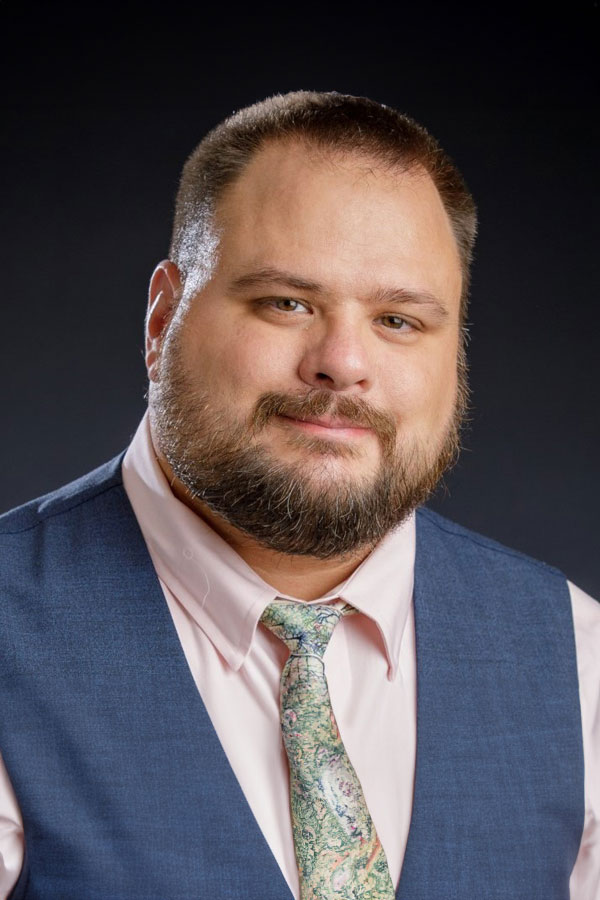
Jason DeFreitas, Ph.D., joined Falk College in the Department of Exercise Science as a professor and department chair in 2024. He earned his Ph.D. and master’s degree from the University of Oklahoma, where he later became a faculty member, spending 11 years teaching classes primarily focused on neuroanatomy and neuromuscular physiology.
His research focuses on how the brain controls movement and how aging and training change that control system. While at Oklahoma State, he won several university-wide awards for his research.
DeFreitas was among the second cohort of the Hevolution/AFAR New Investigator Awards in Aging Biology and Geroscience Research, a grant program that enables early career investigators with labs in the United States and Canada to advance research projects in basic biology of aging and geroscience projects that pave the way for healthspan-expanding therapeutics and treatments.
“Dr. DeFreitas has established himself as a highly productive scholar in neuromuscular physiology and exercise neuroscience,” says Falk College Dean Jeremy Jordan. “His publication record demonstrates both quantity and quality, with 91 peer-reviewed articles that have garnered over 2,500 citations. Of his total publications, he has maintained first or senior author position on 54 percent of papers, demonstrating his leadership role in research collaborations.”
Ignatius Ijere, Public Health
Promoted to Teaching Professor
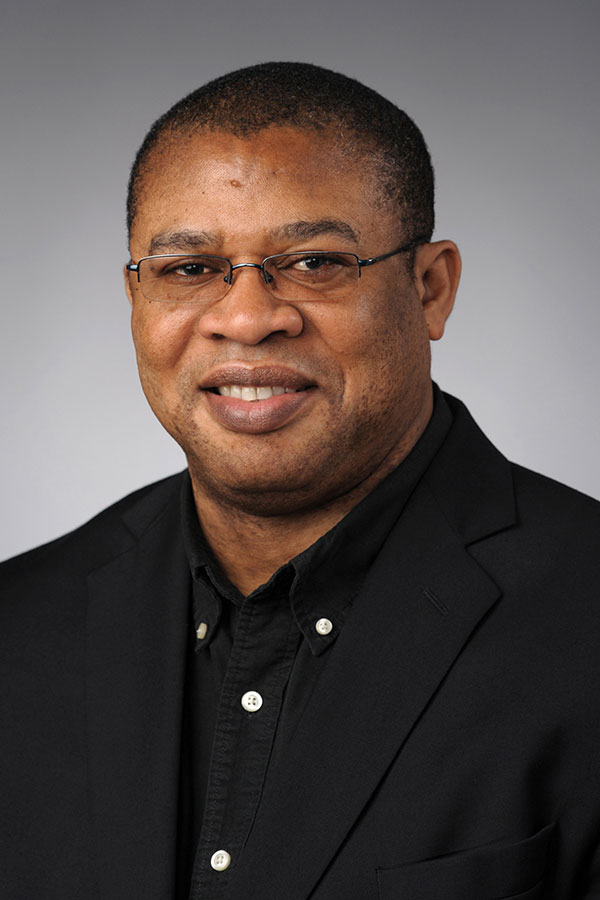
His expertise is in the areas of mental illness and addiction with professional experience as a mental health and addiction counselor with the Gateway Foundation and Thresholds Psychiatric Rehabilitation Centers. He previously served as an adjunct faculty member in the Department of Public Health at the College of DuPage, Waubonsee Community College, and St. Augustine Community College.
“Peer and student evaluations of Dr. Ijere’s teaching performance are consistently positive and describe a deeply respectful professor who cares about student well-being,” Department of Public Health Chair David Larsen says. “They also a describe an approach to teaching which is skillful, particularly when it comes to organizing complex and/or difficult material in ways that students can understand. Dr Ijere has taught an incredibly diverse menu of courses, and I laud his willingness to step in and teach courses on overload that are critical to department success.”
Jeremy Losak, Sport Analytics
Promoted to Associate Professor with Tenure
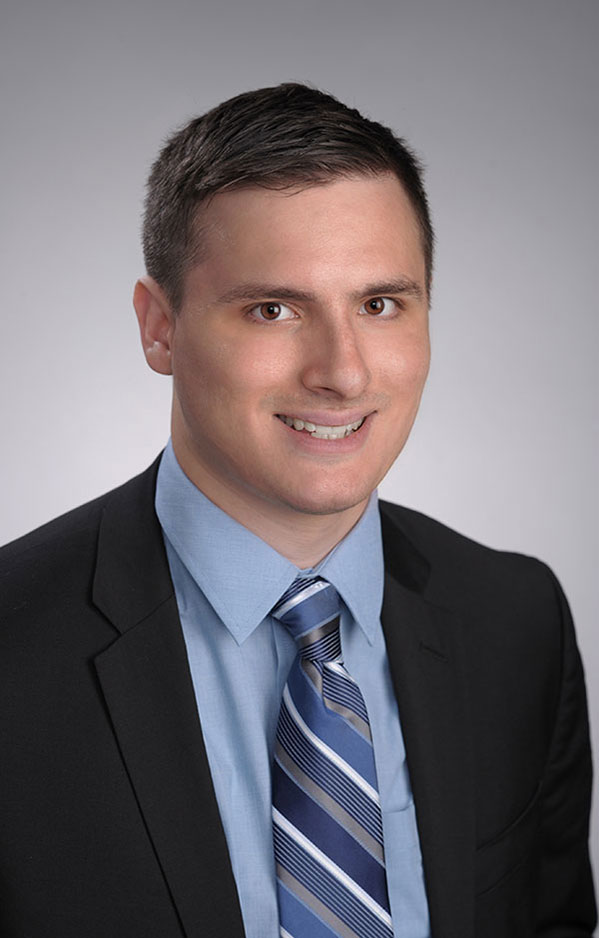
He is one of the faculty members who organizes and runs the Berlin Sports Analytics Academy, a program that brings high school students from across the country to Syracuse University over the summer to provide them with an immersive, hands-on college preview.
“Jeremy is an outstanding teacher and mentor, known for his dedication to student success both inside and outside the classroom,” says Sport Management Professor Rodney Paul, Ph.D., director of the Sport Analytics program. “His engaging teaching style and accessibility have made a lasting impact on the Sport Analytics program.
“Jeremy’s research spans sport economics, sports betting, and fantasy sports, with work published in leading journals such as the Journal of Sport Economics and the International Journal of Sport Finance,” Paul adds. “This is a well-earned recognition of his contributions across teaching, mentoring, and scholarship. Congratulations, Jeremy!”
Miriam Mutambudzi, Public Health
Promoted to Associate Professor with Tenure
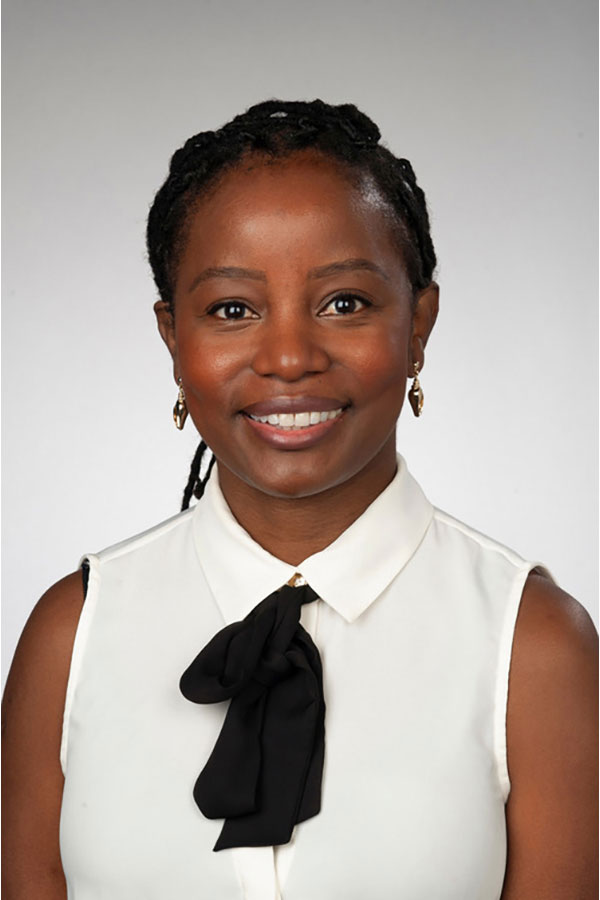
Prior to joining Syracuse University, Mutambudzi served as a research associate in the MRC/CSO Social and Public Health Sciences Unit at the University of Glasgow in Scotland, and a guest epidemiology professor in the Department of Epidemiology and Social Medicine at the University of Antwerp in Belgium. She has published extensively in peer-reviewed journals, including the European Journal of Ageing, Journal of Gerontology: Medical Science, and the Journal of Occupational and Environmental Medicine.
“Dr. Mutambudzi has established herself as a leading scholar in life-course epidemiology, with expertise in examining how socially patterned exposures and cumulative biological burden influence disease risk and health outcomes in older adults,” says Falk College Dean Jeremy Jordan. “Her research portfolio demonstrates both impressive productivity and significant impact on the field.”
Lisa Olson-Gugerty, Public Health
Promoted to Teaching Professor
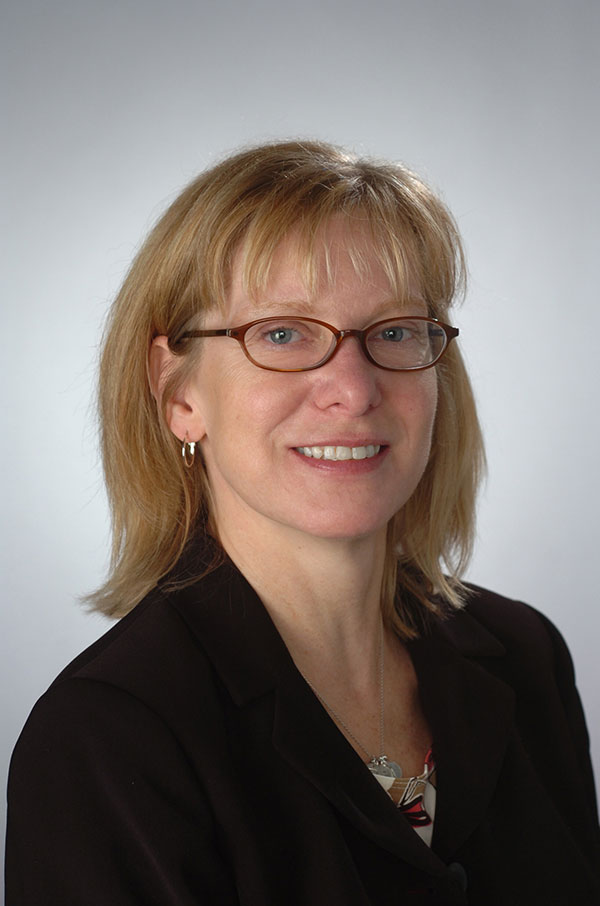
Olson-Gugerty is a nurse practitioner who maintains an outside practice as an emergency healthcare provider at a regional community healthcare center. She earned her Doctor of Health Science (D.HSc.) from Nova Southeastern University, and she also holds a Master of Public Health from the University of South Florida, a master’s degree in Nursing, Family Primary Care, from SUNY Upstate Medical University, and a bachelor’s degree in health science from SUNY Cortland.
Olson-Gugerty has served as a faculty thought leader by granting interviews to several top media outlets, including most recently ABC News, Yahoo Life, and Parade.
“Professor Olson-Gugerty has a background as both a practicing clinician and an academic,” says Department of Public Health Chair David Larsen. “This has informed her teaching philosophy, which emphasizes real word applications and the development of student critical thinking skills. She is dedicated to the student experience and works to create an inclusive and welcoming classroom environment.”
Stefanie Pilkay, Social Work
Promoted to Associate Professor with Tenure
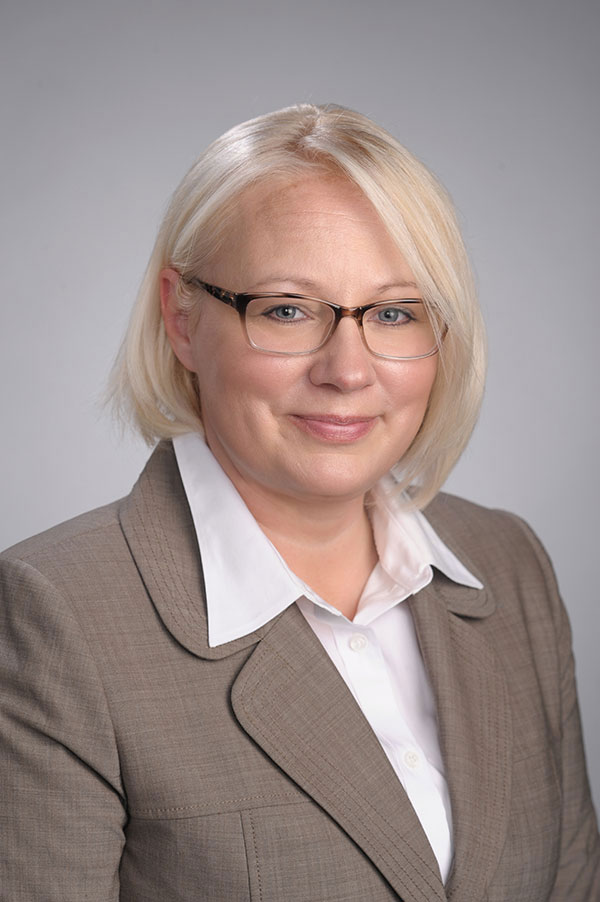
Pilkay’s scholarship addresses longstanding needs to better understand the relationships between adversity, epigenetic changes, and developmental outcomes including health and behavior to improve treatment and prevention outcomes for children and adolescents with health and behavioral issues exposed to poverty, stress, and environmental toxicants. Dr. Pilkay’s pioneering studies have been published in peer-reviewed journals, and her work has been supported by external grants. She has investigated particularly important questions of relevance to social work and genetics, especially in her pioneering work on trauma and its impact on gene expression.
“Dr. Pilkay is an exceptional addition to our faculty, and we are thrilled to welcome our newest colleague to our ranks!” says School of Social Work Chair Carrie Jefferson Smith.
Xiafei Wang, Social Work
Promoted to Associate Professor with Tenure
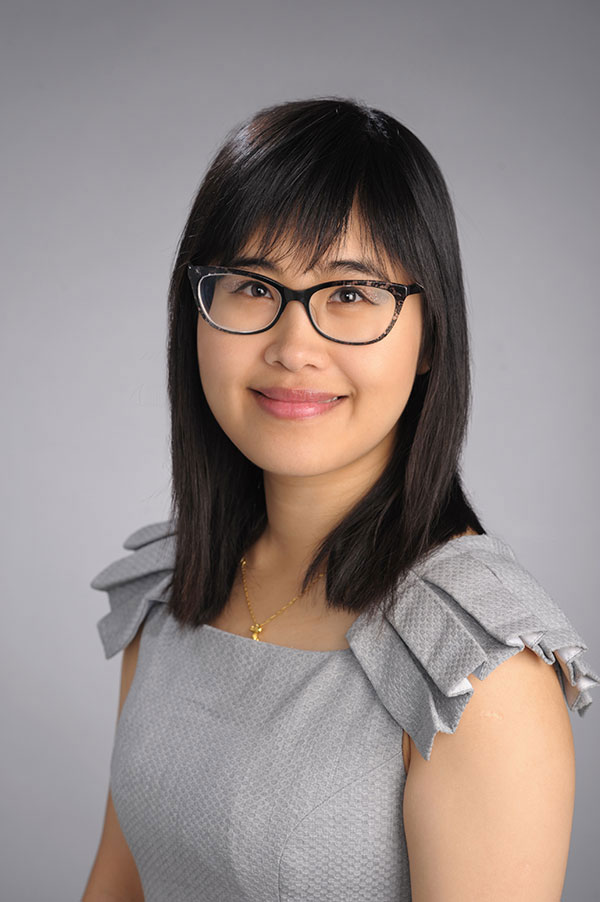
Wang’s scholarship addresses childhood trauma, intergenerational transmission of trauma, resilience, and the roles of race, gender, rural culture, and military experiences. Her work provides direct implications for designing programs and policies for diverse people experiencing trauma.
Awarded the Falk College Faculty of the Year Award for Excellence in Research in 2021, Wang has published extensively in high-impact journals and in chapters of peer-reviewed books. She has established a robust record of external funding from notable sources, including the Health Resources Services Administration and National Institute of Health.
“Dr. Wang has contributed substantially to the teaching and service environments of our program,” School of Social Work Chair Carrie Jefferson Smith says. “We are delighted to welcome Dr. Wang as a fully tenured colleague, and we anticipate a bright future as she continues to influence future directions in our understanding of trauma.”
As part of Syracuse University’s go-forward plan announced this past fall for the Falk College human dynamics programs, the Department of Public Health will join the Maxwell School of Citizenship and Public Affairs and the School of Social Work will be housed in the School of Education starting July 1, 2025.
2025 Falk College Convocation
The celebration included two members of Syracuse University’s Board of Trustees, Ken Pontarelli and Deborah Leone, who had family members graduating from Falk, and a surprise visit from Otto the Orange, who helped Falk College Dean Jeremy Jordan take a selfie in front of all the graduating students!
Watch the slideshow above for photos from Convocation, and visit the Syracuse University Commencement website to watch the full Falk Convocation ceremony.
Guest speaker Benita Fitzgerald Mosley, an Olympic gold medalist and visionary executive, delivered an inspiring speech during which she encouraged graduates to ask “Why not me” when they dream about the goals they have set for their careers and personal lives. Here’s a video and story to learn more about Fitzgerald Mosley.
Dean Jordan reminded the graduates that they follow generations of Syracuse University alumni who refused to settle, pursued innovation, and conquered the challenges of their time. Now, it’s their turn.
“The worlds of sports, human performance, and applied and behavioral health are evolving rapidly,” Jordan said. “To become effective leaders, you must evolve with them—and I have every confidence you will.
“At Syracuse University and Falk College, we have strived to prepare you to meet these challenges head-on and become the change agents our world desperately needs,” he continued. “The education you’ve received here has equipped you with the tools to make meaningful contributions in your chosen fields. Your unique perspectives, innovative thinking, and commitment to excellence will undoubtedly lead to breakthroughs that improve lives and communities.”
Class of 2025 Falk College Scholars
Seven members of the Class of 2025 have been named Falk College Scholars–the highest academic award conferred by the Falk College of Sport and Human Dynamics on graduating seniors. Falk Scholars represent undergraduate students who display academic excellence, exceptional campus and community engagement, independent research and creative work, innovation in their disciplinary field, and personal integrity.
We asked the Class of 2025 Falk Scholars to describe their most impactful experiences at Syracuse University. Here’s what they wrote:
Grace Elizabeth Brashears (Human Development and Family Science)
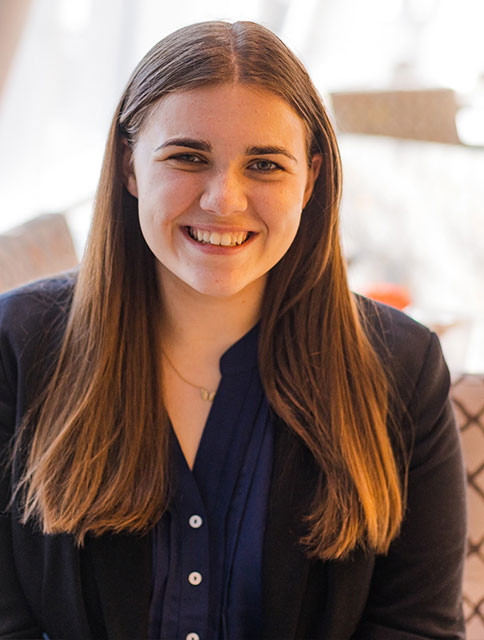
Throughout my time at Syracuse University and Falk College, I have been honored to take part in various service initiatives that help the very community I have called home for the last four years. The most influential of these was my work with Upstate Golisano Children’s Hospital as a Child Life Practicum student, and as president of OttoTHON at Syracuse University. In my time with OttoTHON, I have led a generation of students to raise over $400,000 for Upstate Golisano Children’s Hospital.Alongside my work with Golisano Children’s Hospital, I have been given the opportunity to impact my community through assisting in research that is developing more accessible research ethics training for individuals with intellectual and developmental disabilities. Additionally, I have worked with various organizations in Syracuse, including the Boys and Girls Club, RISE (Refugee and Immigrants Self-Empowerment program), beneath the surFACE at Upstate Cancer Center, Syracuse Red Cross, the Children’s Advocacy Center, Upstate Community Hospital, and more.
These opportunities, heavily supported by Syracuse University and Falk College, have successfully set me up for a lifetime of service and philanthropy, and a fulfillment of my purpose to use my education to benefit the lives of those around me. I will never forget my time at Syracuse and a part of me will always be here on the hill. Go Orange!
Xuezhu “Stephanie” Hua (Nutrition Science)
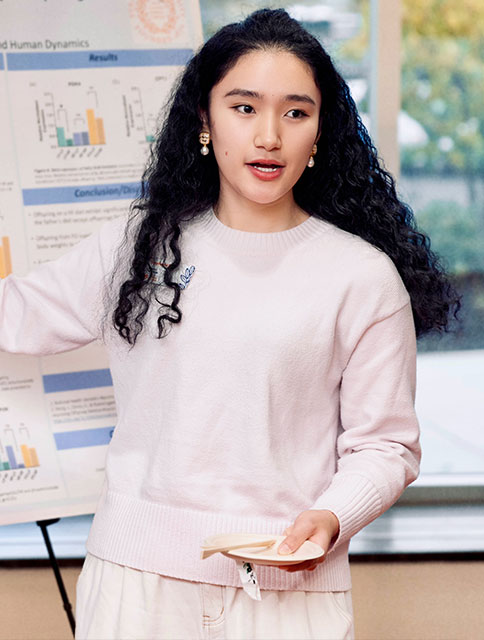
When I was a sophomore, I led a dorm room recipe project through the Office of Student Services in Falk College. The goal was to introduce healthy, easy-to-make snacks that people could take with them to class or work. I created three recipes—chocolate bark, microwave cake, and banana wraps—and prepared 100 samples. I presented these to students and faculty from Falk College, explaining the nutritional benefits and preparation methods. I found this experience incredibly rewarding and empowering as it allowed me to apply my knowledge to help others improve their health and well-being. It instilled in me a lasting commitment to use my expertise to make a meaningful impact in the community.
Another inspiring experience was my honors thesis done in Dr. Latha Ramalingam’s lab, where I investigated the effects of fish oil in reducing paternal obesity and improving muscle health in male offspring. This project was both inspiring and transformative—it was where I discovered my passion for biomedical science. Combined with foundational coursework such as Dr. Margaret Voss’s biochemistry class, anatomy, and physiology, I developed a deep passion and appreciation for the complexity and intricacy of human metabolic physiology—and the many avenues through which we can address disease. These experiences shaped my path toward studying metabolic diseases and cellular metabolism, fields where my passion aligns with pressing global health challenges.
Benjamin Lanza Jennings (Sport Analytics)
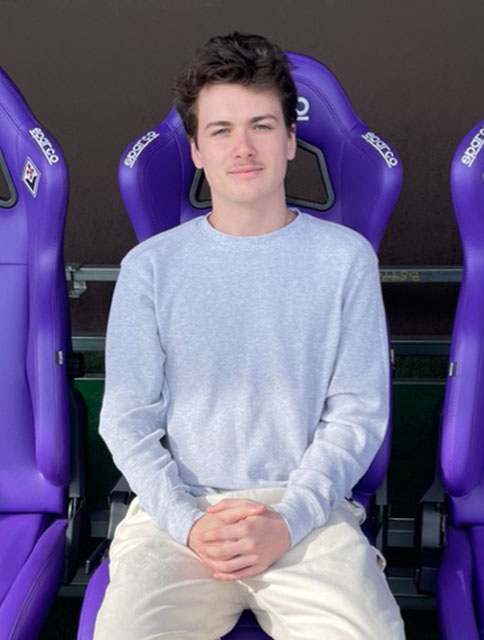
Being named a Falk Scholar is an incredible honor and a reflection of the meaningful experiences I have had at Syracuse University. I have always been passionate about working in sports, and Falk College gave me the tools, support, and guidance to pursue a career in sport analytics.One of the most memorable experiences was traveling to Italy as part of the first Sport Data in Italian Football course. I learned a ton about analytics in a global context, was immersed in the Italian culture, and had the opportunity to deliver a data-driven presentation to the Bologna FC professional soccer team.
Working with Syracuse’s football and women’s soccer teams gave valuable hands-on experience in sports I am truly passionate about. Winning the 2024 Syracuse University Basketball Analytics competition helped me grow both technically and creatively. All of these opportunities provided me with the skills and confidence to succeed with professional organizations.
I am incredibly grateful to the professors, advisors, and staff at Falk College who encouraged me, opened doors, and helped me prepare for what’s next. Syracuse University and the Sport Analytics program made it possible to turn my passion into a path forward in the sports industry.
Jarrett Markman (Sport Analytics)
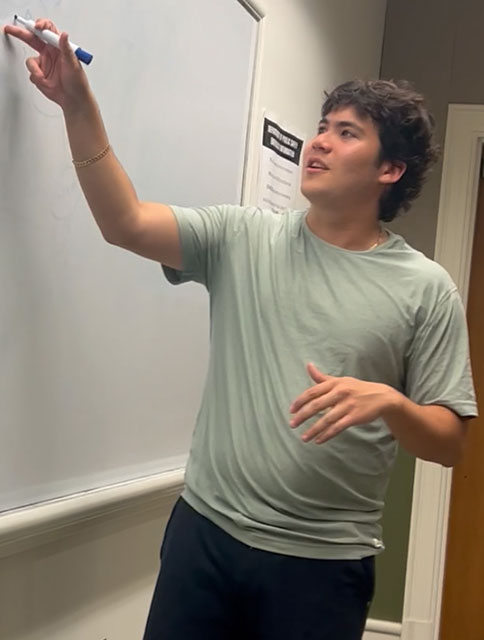
The most impactful experience I’ve had at Syracuse University was the opportunity to develop a passion for learning. In the Sport Analytics program, I was able for the first time to blend my passion for academics (math-based work) with one of my favorite hobbies, sports. The program provides many learning opportunities, such as the many academic clubs presented to students in the major.Given my background playing tennis at a high-level, I was interested in creating my own club and combining my abilities as a tennis player and sport analyst. Due to the lack of popularity in tennis across the country compared to other sports, we built a close-knit group of members who discussed a variety of the technical and physical aspects of tennis that come from the perspective of playing, watching, and analyzing.
In our club, we utilized the knowledge gained from our coursework and applied that to various aspects of tennis. The Tennis Analytics Club has heightened my passion for learning, leveraging the power of data science (notably statistics), machine learning, and programming to identify the various ways to formulate powerful insights.
Anna Meara Pierce (Sport Analytics)
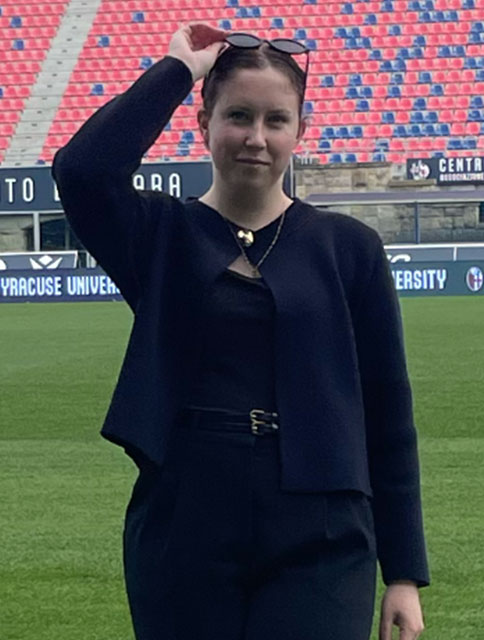
A lot of the impactful experiences I’ve had at Falk and Syracuse University have been on a smaller level, including the support of my professors and advisors. However, I’ve been lucky enough to go on several department-sponsored trips to conferences or other sport-related events.One such event was the 2024 NFL Draft in Detroit. The Sport Analytics and Sport Management teams used a previous connection with one of the community tourism-related groups organizing the draft to take six of us (three analytics students and three management students) to work the draft in areas from combine-related fan activations to manning the information desk. While I already knew that I wanted to work in fan engagement within the sport, the draft opened my eyes to the potential reach and success of a tent-pole event such as the draft, as well as to the world of fan engagement and events within football.
Ultimately, this trip showed me the possibilities for impact on the business side of the NFL and its teams, driving me to take a position with the Green Bay Packers in their business analytics department for post-graduation.
Nicole Yanza Shanguhyia (Public Health)
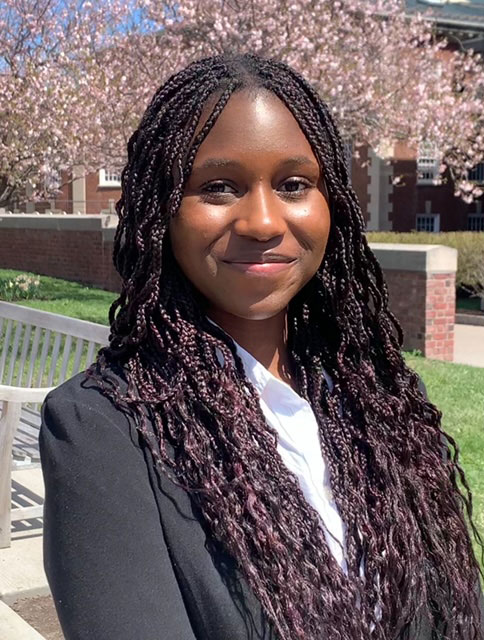
During my time at Syracuse University I’ve had the opportunity to meet a lot of wonderful people, but none quite like the members of the Student Association of Public Health Association. The designated student organization for the Department of Public Health, better known as SAPHE, was first introduced to me in my sophomore year.When Professor Lisa Olson-Gugerty announced she was reviving the student-run club, I wasu admittedly hesitant to join. At this point, I had yet to grow close to anyone in my major and was unsure of how welcoming other students would be. To my surprise, SAPHE evolved into the highlight of my time in public health. Through my involvement in the club, I deepened my understanding of health awareness by planning semester-long initiatives and on- and off-campus activities.
But more importantly, I formed lasting connections with so many incredible people in my major. Because of SAPHE, I could look around my classes and find comfort in familiar faces. As I’m preparing to move forward and reflect on my experiences at Syracuse University, I can say with confidence that the members of SAPHE represent the best that my department has to offer.
Jonah Aaron Soos (Sport Analytics)
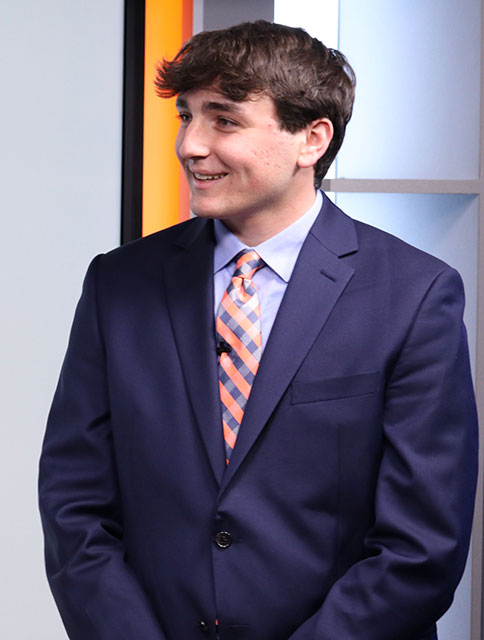
The moment that stands out during my journey at Falk College was the privilege of experiencing different parts of the sports industry across the country. Through research and case competitions, I have had the opportunity to visit multiple cities to network with students and professionals from around the country, experience new cultures, build bonds with fellow students, and have a chance to represent Syracuse and compete against top analysts nationwide.My most impactful trip was attending the Society for American Baseball Research (SABR) Analytics Conference in Phoenix, Arizona, each of the past two years with 20 other Syracuse students to compete in the Diamond Dollars competition and present some of my own research on Major League Baseball umpires and the challenge system.
Working closely with my peers has created a sense of community within Falk College, for which I’ll always be grateful, and has helped me make lifelong friends and many incredible memories. I’m excited to return to Phoenix as an alum and watch future generations of Falk students compete, and I’m also excited to see how they can one-up what we accomplished!
Faculty of the Year Awards

Mary Kiernan, Colleen Cameron, and Fei Pei were honored with 2025 Falk College of Sport and Human Dynamics Faculty of the Year awards for excellence in teaching, service, and research, respectively. The honorees were nominated by their peers for outstanding teaching, scholarship, and internal and professional service contributions and announced by the Falk College Faculty Council in late April.
Here’s a look at the 2025 honorees with comments from their award presenters:
Chef Mary Kiernan, M.B.A.
Undergraduate Director, Food Studies, and Teaching Professor, Nutrition and Food Studies
Evan Weissman Memorial Faculty of the Year Award for Teaching Excellence
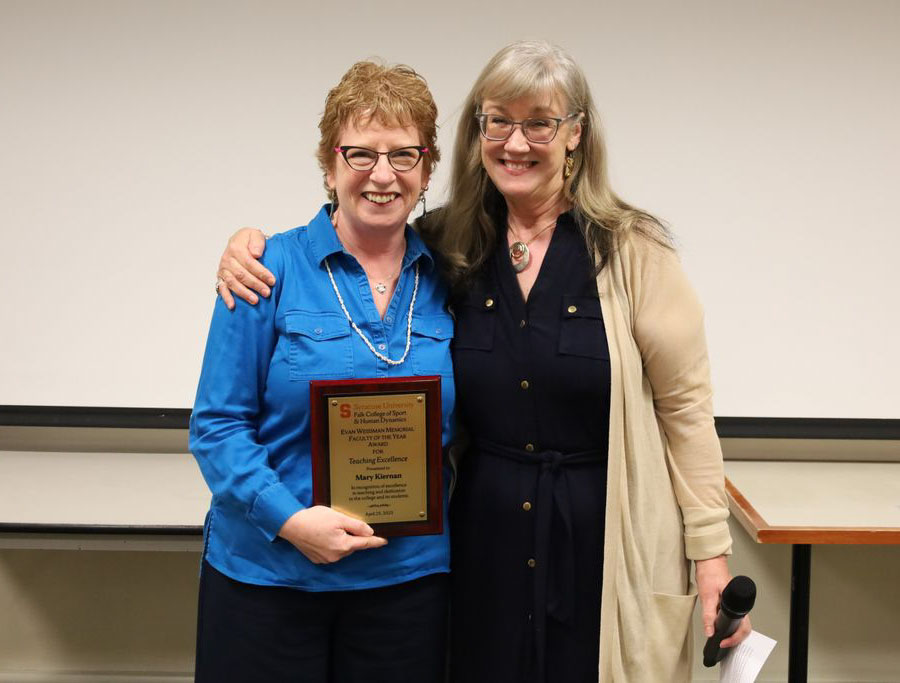
“It’s hard to imagine a more fitting honoree for an award that bears Evan’s name. In so many ways, Mary embodies Evan’s philosophy—his passion for student mentorship, commitment to teaching, dedication to social consciousness, and, of course, his dedication to food studies.
“Mary is a Teaching Professor in the Department of Nutrition and Food Studies, where she is known for transforming her classrooms into dynamic, immersive spaces. Her courses—spanning food safety, systems management, and urban food systems—equip students with essential technical skills while also challenging them to explore the social, cultural, and ethical dimensions of food.
“What truly distinguishes Mary in the teaching kitchen is her ability to bridge theory and practice. Whether she’s redesigning core curricula, mentoring independent projects, or advising students, she brings clarity, creativity, and compassion to everything she does.
“Her leadership as Undergraduate Director for the Food Studies program, her engagement with professional networks, and her commitment to inclusive, culturally rich programming and hands-on culinary experiences enrich our campus and our community. Mary’s work exemplifies excellence in education—and the spirit of this award.”
Learn more about Evan Weissman, Ph.D., Associate Professor in Food Studies and Nutrition who passed away in 2020.
Colleen Cameron, CCLS, M.Ed.
Undergraduate Director and Professor of Practice, Human Development and Family Science
Faculty of the Year Award for Excellence in Service
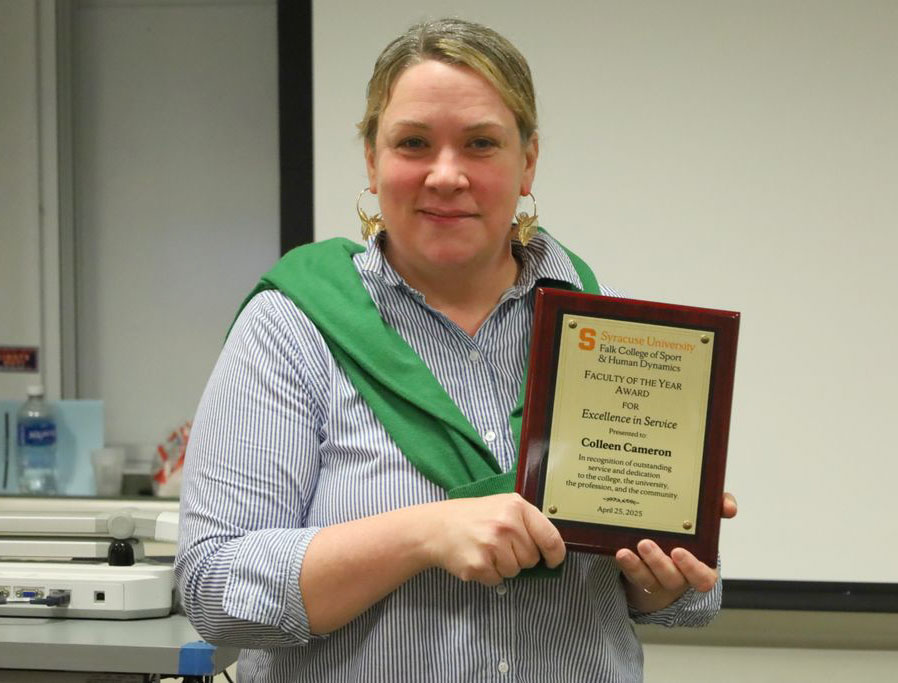
From presenter Tracey Reichert Schimpff, M.A., Ph.D., LMFT, Graduate Director and
Associate Teaching Professor, Department of Marriage and Family Therapy:
“Colleen is a Professor of Practice in the Department of Human Development and Family Science (HDFS), and a certified Child Life Specialist and End of Life Doula. She has been with Syracuse University since 2009, serving students, her Department, and the field.
“Her nomination letter states, ‘Colleen has always exemplified the very best of student-focused work and a commitment to our students and program. She is uniquely and wholly committed to the success of our students and has always gone above and beyond. Overall, Professor Cameron’s service work has been exceptional both in its breadth and in its impact.’
“In the nomination materials, it was noted that Colleen’s signature service is heading the Child Life program. It is an endorsed program that leads graduates to become certified Child Life Specialists. This requires knowledge of requirements, oversight of curriculum, and guiding students through the process that leads to certification. Colleen single-handedly ensures that this program continues.
“This past year, Colleen also served as Undergraduate Director in HDFS, managing curriculum, working with admissions and marketing, and engaging directly with students (and sometimes families). In a year of transition, I imagine this has been quite an undertaking!
“In HDFS, Colleen also serves as faculty advisor and chair of the Student Engagement Committee, which was created to increase student voice and connection. From what I understand, this committee has grown, and students have benefited greatly from Colleen’s dedication. Colleen served as mentor for Renee Crown honors students and led the HDFS New York City Career Immersion Trip, a trip that is highly regarded by HDFS students.
“In addition to the significant roles she plays in HDFS, Colleen also served at college and university levels. In 2024, Colleen was selected to serve on the Human Development Task Force. She was very committed to the process, and worked diligently to gather information and advocate for her department.
“Collen serves on the Syracuse University Senate and its Research and Creative Scholarship Committee. Collen is also engaged in service to her profession, acting as Director of the Conference Committee and Co-Chair of the Clinical Experience Task Force for the Child Life Academic Society. Finally, Colleen has even found time to volunteer at her school district and community council.
“It seems obvious that Colleen has made significant contributions to students, her department, and the larger University. She serves with commitment and leads with passion and professionalism. I am proud to call Colleen my colleague.”
Fei Pei, Ph.D.
Assistant Professor, School of Social Work
Faculty of the Year Award for Excellence in Research
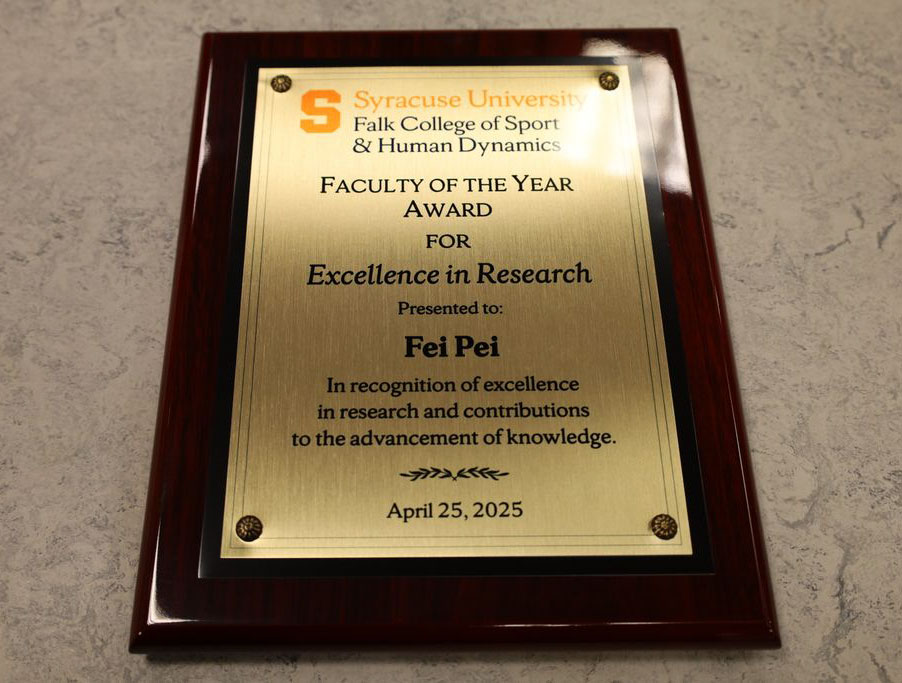
“Dr. Pei, who is in her fourth year in the School of Social Work, is a dedicated and productive researcher. Her advanced quantitative work demonstrates a clear research focus and trajectory and contributes to a crucial discourse in our field on the effects of neighborhood conditions, including violence, on children’s development.
“Fei has published 37 peer-reviewed articles in top-ranking interdisciplinary journals, including “Child Abuse and Neglect,” “Development and Psychopathology,” and “Children and Youth Services Review.” In 2024, she published four articles–three of which are first-authored–and submitted four additional manuscripts that are currently under review.
“In 2024, Fei also submitted four external grant applications, including three NIH (National Institutes of Health) applications for which she is principal investigator. Three of these applications are still under review and could use our collective good vibes!”
Gold Standard
Olympic gold medalist and visionary executive Benita Fitzgerald Mosley says it has been her lifelong mission to help people win gold medals in business–and in life.
“My gold medal is the gift that keeps on giving,” Fitzgerald Mosley says. “I am forever grateful, so I want to pay that gift forward.”
To get there, Fitzgerald Mosley highlights five “Olympic rings” to help people achieve their goals: Have a good start, set high goals, run your own race, power through hurdles, and have a strong finish.
“You have to ask yourself, why not me?’’ Fitzgerald Mosley says. “Why can’t I be the best in the world at what I do?”
From becoming the first African-American woman to win the 100-meter hurdles at the 1984 Olympics to her current role as chief executive officer of Multiplying Good, Fitzgerald Mosley has persistently broken barriers and advanced the idea that sport has the power to inspire and change the world.
Her enormous impact as a results-oriented leader in the Olympic, non-profit, and corporate worlds is why Falk College Dean Jeremy Jordan asked Fitzgerald Mosley to be the keynote speaker at the Falk Convocation at 12:30 p.m. May 10 in the Lally Athletic Complex.
“Benita’s ‘why not me?’ message encourages us to challenge societal expectations and embrace our potential, while Multiplying Good is helping people bring about positive change and inspiring them to do more,” Jordan says. “The life lessons and insights that Benita will share May 10 will provide valuable inspiration to our graduates and all of us.”
Using Fitzgerald Mosley’s five Olympic rings, here is her remarkable story:

Have A Good Start
Fitzgerald Mosley often uses a quote from former American politician and motivational speaker Les Brown, who said, “You don’t have to be great to get started, but you have to get started to be great.”
Fitzgerald Mosley’s parents, Fannie and Rodger Fitzgerald, were both educators and they encouraged Fitzgerald Mosley to get started in as many extracurricular activities as possible in their hometown of Dale City, Virginia. By participating in gymnastics, softball, majorettes, and track, and learning the piano, violin, flute and piccolo, Fitzgerald Mosley discovered what she loved and was good at and where to focus her attention.
“They were very supportive and stood by me in every aspect of my life,” Fitzgerald Mosley says of her parents. “They celebrated my every achievement, large and small, and I loved to make them proud.”
While she became the first chair flute for the Gar-Field High School symphonic band, Fitzgerald Mosley says she wasn’t very good at softball and grew too tall to be a gymnast. But middle school physical education teacher, family friend, and gymnastics coach Gwen Washington was also the coach of the track team and when it became obvious that Fitzgerald Mosley had outgrown gymnastics, Washington suggested she join the track team because she had seen Fitzgerald Mosley outrun the boys in gym classes.
“So I went out for the track team and started winning races from the very beginning,” Fitzgerald Mosley says. “It wasn’t until I was 12 years old and in the seventh grade that I even discovered my athletic prowess.”
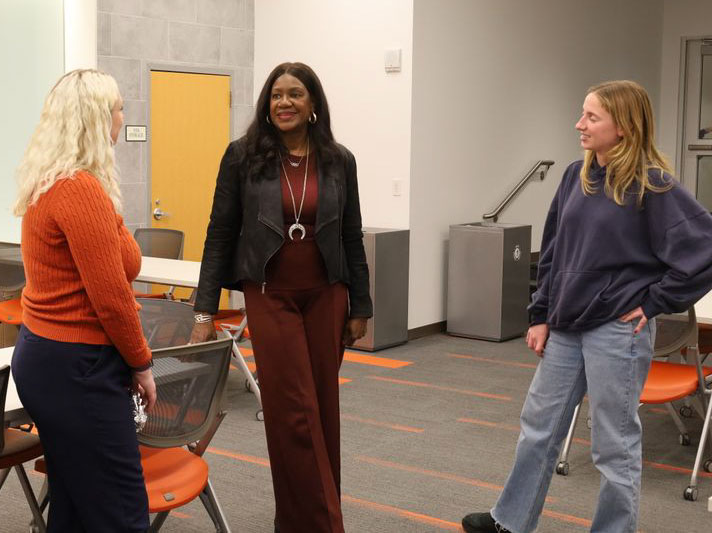
Set High Goals
As a high school freshman sprinter and hurdler, Fitzgerald Mosley helped the track team win its fourth consecutive Virginia state championship. She was a teammate of senior Paula Girven, who represented the United States in the high jump in the 1976 Olympics and qualified for the team in 1980. Their high school track coach, Anne Locket, also led the girl’s gymnastics and basketball teams to state championships.
“Coach Locket said to me, ‘You know, you can be an Olympian someday just like Paula,’ and I looked at her like she was from Mars,” Fitzgerald Mosley says, smiling. “But having a coach believe in you and say that to a youngster at 14 years old, it set me up for great things to come.”
By 1980, Fitzgerald Mosley was 18 and already a track star–and an industrial engineering major–at the University of Tennessee, where she would become a 14-time All-American and four-time NCAA hurdles champion. Like Girven, she made the 1980 Olympic team but didn’t participate because the United States led a boycott of the 1980 Summer Games in Moscow to protest the Soviet invasion of Afghanistan.
Fortunately for Fitzgerald Mosley, she was still in college and had the benefit of having access to coaching, training equipment, and the highest level of competition in college. This was a time when Olympic athletes were strictly amateurs who couldn’t make money off their athletic achievements, and many athletes who qualified for the 1980 Games, like Girven, weren’t able to return for the 1984 Games.
“At that point, people didn’t have these long careers spanning three- and four- and five-Olympic Games that started with my generation because they started to allow us to make money while we were competing,” Fitzgerald Mosley says. “The two other hurdlers that were on the Olympic team with me in 1980 didn’t make it again in 1984, so that was their one and only chance to be an Olympian.”
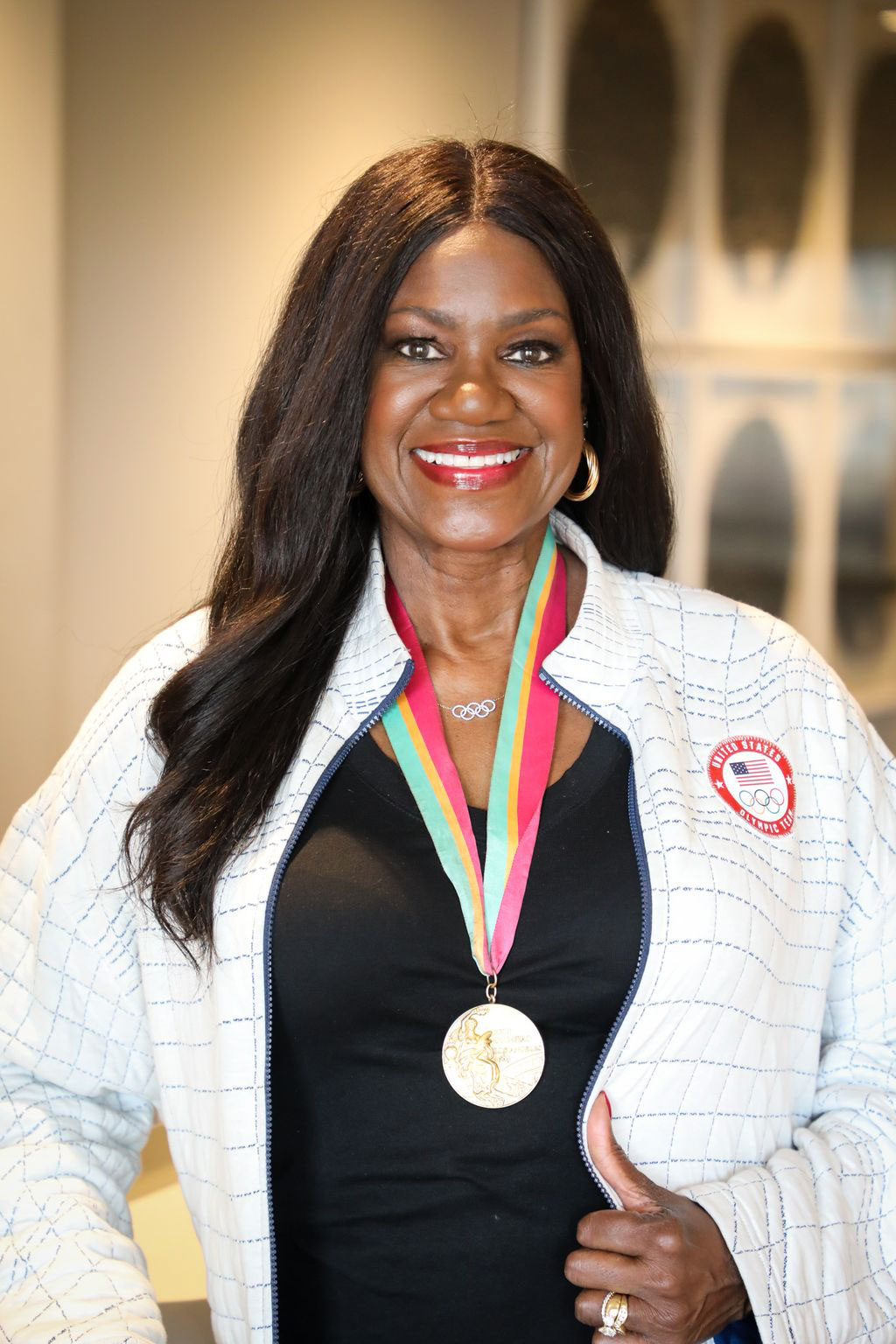
Run Your Own Race
For Fitzgerald Mosley, the last decade of her professional career has been similar to her Olympic performance where she kicked it into an even higher gear to beat the favorite, Great Britain’s Shirley Strong, and win the gold medal.
In 2016, she was named CEO of Laureus, a nonprofit organization that believes sport has the power to change the world. After stints as a senior advisor for Airbnb and president of the FundPlay Foundation, Fitzgerald Mosley was hired for her current position as CEO of Multiplying Good in July 2023. The mission of Multiplying Good is to help people reach their full potential and discover their power to deliver impact and bring about meaningful change.
“I really believe in– and care about–coming to work every day leading an organization that’s ultimately impacting people’s lives in a positive way,” she says. “That’s the utmost kind of thrill for me.”
Over time, Fitzgerald Mosley says all her experiences led to this moment of clarity where she realized she can help people and organizations win gold medals in life and business. That’s her daily focus, whether she’s leading Multiplying Good, serving on the Board of Directors for the Special Olympics, or speaking to a stellar group of graduates from Falk College.
“Where I can show up in the world is to truly help young people derive the benefits of sport participation in communities that otherwise wouldn’t have those opportunities, by funding those organizations, by helping them build their capacity so they could serve more young people, not just in the United States, but around the world,” Fitzgerald Mosley says.

Power Through Hurdles
Like one of Fitzgerald Mosley’s races, the line from Olympic gold medalist to influential executive may have been a relatively straight one, but not without its hurdles.
Fitzgerald Mosley’s bid for the 1988 Olympics was slowed by an ankle injury that required surgery in 1987. Still, she qualified for the Olympic trials and was leading in the finals before she tripped over the last hurdle and missed making the team by 1/100th of a second.
“The hardest team to make in the world is a U.S. team, particularly in swimming and track and field, where you pick yourself, no one picks you,” Fitzgerald Mosley says. “You have strep throat, you hit a hurdle, you fall in a race, you’re injured, sorry, you don’t get to go.”
Fitzgerald Mosley wasn’t able to capitalize financially on her Olympic success the way athletes can today, so she didn’t have a lot of money when she retired from running. But she did have her industrial engineering degree from Tennessee and found a job with a defense contractor, where she was working on projects such as conducting time and motion studies for the M1 Abrams tank or creating software design documents for the Seawolf submarine.
“Don’t get me wrong, these are all important things. And of course, I have the utmost admiration for the people who serve in our military,” Fitzgerald Mosley says. “But I just wasn’t the person to do that kind of work, and I think it was because it wasn’t aligned with my passion.”
After working as president and CEO of Women in Cable Telecommunications (now called The WICT Network), an organization dedicated to empowering women leaders, Fitzgerald Mosley started to hit her professional stride with jobs as Chief of Sport Performance for USA Track and Field and COO of the U.S. Olympic and Paralympic Committee.
“My career in both sport management and nonprofits was born at that point in time, when I realized I didn’t have to train three to six hours a day to participate in sport,” she says. “That was the big light-bulb moment for me to get that opportunity to work first for Special Olympics International and then with the Olympic and Paralympic Committee and have my heartstrings pulled by the mission of the organization.”
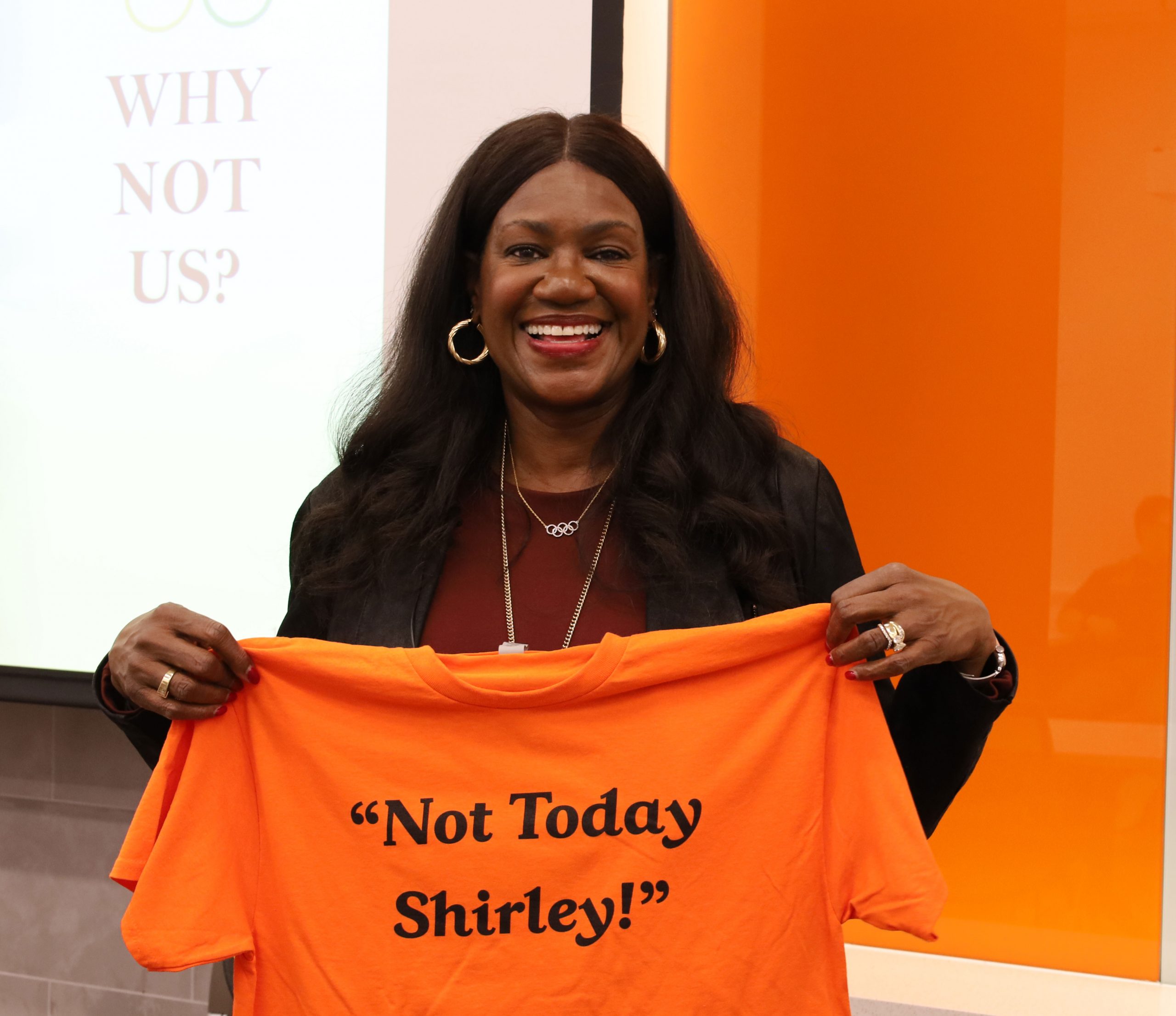
Have a ‘Strong’ Finish (a.k.a. Not Today Shirley)
Fitzgerald Mosley took full advantage of her second chance at the 1984 Olympic Games in Los Angeles, where she needed to beat Strong. At the 1983 World Championships, Strong had defeated Fitzgerald Mosley, a fitness fanatic who noticed that Strong was smoking cigarettes following their race.
“She’s smoking and she just beat me? She will never beat me again,” Fitzgerald Mosley told herself. “The next year (at the Olympics), I saw her smoking a cigarette between the semifinals and finals, and that reminded me of my vow.
“In the finals when we were racing, I saw her out of the corner of my eye, and I said to myself, ‘Not today Shirley,’’’ she says.
Fitzgerald Mosley ran the race in 12.84 seconds, beating Strong by 4/100th of a second to become the second U.S. woman and the first African-American woman to win a gold medal in the 100-meter hurdles. The 1984 track and field events were held in the Los Angeles Coliseum, where Babe Didrikson became the first U.S. woman to win what was then the 80-meter hurdles in 1932.
“It was magical,” Fitzgerald Mosley says. “To be on your home soil and walk into a stadium with 90,000 people screaming ‘U-S-A’ and cheering for you once you win, there’s nothing better.”
Fitzgerald Mosley has been inducted into several halls of fame, but she says perhaps her greatest honor occurred when she was selected as one of eight U.S Olympians to carry the Olympic flag into the stadium during the opening ceremony of the Centennial Olympic Games in Atlanta. Legendary boxer Muhammad Ali capped the ceremony by lighting the Olympic cauldron.
“We had practiced the night before under the cloak of darkness because no one knew who the eight of us were going to be that were walking in,” Fitzgerald Mosley says. “And we didn’t know Muhammed Ali was going to be the one who lit the torch.
“It had a mission impossible-type of feel to it, and that was pretty cool to be in on the inside of that little secret as well,” she adds.
Fitzgerald Mosley says she owes everything to her sport experiences, from winning the gold medal to her college education to meeting her husband, former Brown University football player Ron Mosley, with whom she has two grown children; a son, Isaiah, and a daughter, Maya, who runs track at the University of Maryland. She is most grateful to her parents, who encouraged her to get out there and keep trying until she found her passion.
“I would just say to young people in particular, don’t let your fear of failure get in your way of pursuing your dreams,” Fitzgerald Mosley says. “Because even if you fall somewhat short of the ultimate dream, you’re going to be so much further along toward that dream and that goal than you ever would have been if you didn’t start in the first place.”
Class of 2025 Public Health Awards
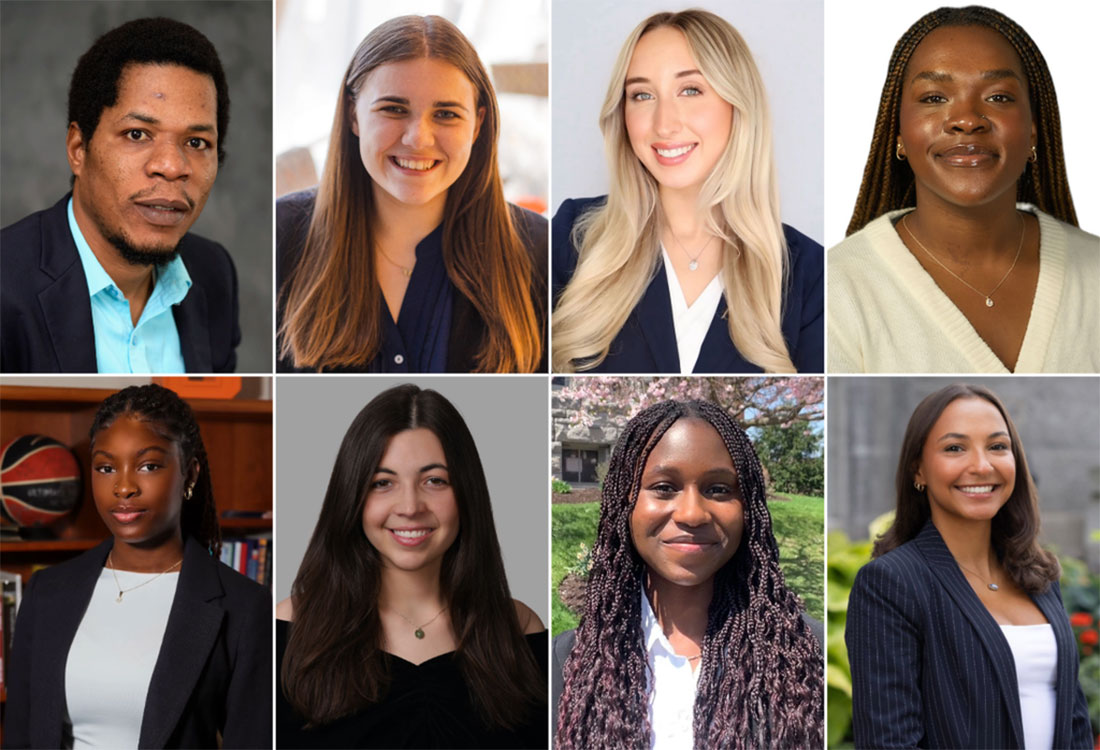
“We seek to be a leader in leveraging public health research and education to create the greatest impact on global health,” says Department Chair and Professor David Larsen. “Our students make achieving this vision possible!”
The Department of Public Health recognizes the outstanding work of the following students:
Undergraduate Awards
Falk College Scholar
Falk College Scholars represent undergraduate students in Falk College who display academic excellence, exceptional campus and community engagement, and personal integrity.
Recipient: Nicole Shanguhyia
Achievements:
- Honors thesis (advisor Associate Professor Bhavneet Walia): The Impact of Sociodemographic Factors on Pregnancy Intention: An Overview of Women’s Health in America. Poster presentation at the SOURCE Research Symposium.
- Publication: Predicting attitudes toward mitigation interventions and social distancing behaviors at the onset of the COVID-19 pandemic in the United States, Health Psychology and Behavioral Medicine.
Capstone Internship:
Allyn Foundation, Syracuse, New York, Assessing Unintended Pregnancy Services in the United States with Regard to Racial and Ethnic Minorities.
What’s next:
MPH Global Health with a certificate in Maternal and Child Health (Emory University, deferred to Fall 2026).
Academic Excellent in Public Health
This award is given to the graduating senior from the Department of Public Health with the highest cumulative GPA in public health core courses.
Recipient: Shelby Fenton
Achievements:
- Chancellor’s Merit Scholarship.
- Vice-President-Fundraising, Global Medical Brigades.
- English Conversation Facilitator, Syracuse University Center for International Services.
- Research Assistant, Project Engage (mentor Senior Associate Dean for Research and Administration and Professor Katherine McDonald).
- Student Editor and Teaching Assistant, Healthy You.
Capstone Internship:
St. Mary’s Hospital, Amsterdam, New York, Becoming Baby Friendly: Improving Breastfeeding Rate in Rural Amsterdam.
What’s next:
MPH Global Health at Syracuse University.
Excellence in Public Health Practice
This award is given to a graduating senior who demonstrates superior knowledge and skill in public health practice.
Recipient: Eniola Festus
Achievements:
- Double major: BS Public Health and Environment, Sustainability, and Policy.
- Research Assistant: Biopsychosocial Processes of Aging in Racialized Communities (mentor Assistant Professor Catherine García).
- Leadership and Practice: Student Co-Director, Syracuse Sustainability; UG student representative, Syracuse University Senate; Chief Data Officer, Student Government Organization; W.E.B. DuBois Scholars Institute, Princeton University; Population Health Intern, Syracuse University Lerner Center.
Capstone Internship:
Lerner Center for Public Health Promotion & Population Health, Syracuse University, Addressing Black Maternal Mortality Disparities: The Role of U.S. Policy and Leadership in Advancing Health Equity.
What’s next:
M.S in Information Systems, Syracuse University School of Information Studies.
Public Health Leadership Award
This award recognizes a graduating senior whose leadership role within Syracuse University organizations, volunteer service, or campus departments has greatly impacted the campus the larger community level.
Recipient: Grace Brashears
Achievements:
- Double major: Public Health and Human Development and Family Science.
- Leadership Work: President, OttoTHON (major fundraiser for Golisano Children’s Hospital and the Children’s Miracle Network); Student Orientation Leader; Co-Founder, Project Sunshine, Syracuse University Chapter; Kappa Alpha Theta Sorority Executive Board.
Capstone Internship:
UMH, Golisano Children’s Hospital, The Role of School-Based Mental Health Programs on Mental Health Outcomes of Middle and High School Students in the United States.
What’s next:
M.S. Child Life and Family Centered Care, Boston University.
Research Award for Public Health
This award is given to a graduating senior who advanced population health through research.
Recipient: Penelope Lee
Achievements:
- Research Assistant: Does increased exposure to COVID-19 increase pandemic-related family stress? (mentor Associate Professor Brittany Kmush). Funded through Syracuse University Bridge SOURCE Award and manuscript in preparation.
Capstone Internship:
Syracuse University Center for International Services,
International Students Experience with Race-Based Discrimination at U.S. Colleges and Universities.
What’s next:
Undecided; interested in data analytic employment positions.
Public Health Social Justice Award
This award is given to a graduating student whose volunteer work, research, and career goals focus on the elimination of inequalities in health.
Recipient: Alyssa Sutherland
Achievements:
- Columbia Public Health Scholars Internship Program.
- CDC John R. Lewis Scholar, Understanding Participation and Enrollment Trends at the PHS Sunset Park, Brooklyn WIC Center Between 2020 to 2022 (in partnership with Public Health Solutions). Presented at the Lewis & Ferguson CDC showcase, runner-up, 2023 Williams-Hutchins Health Equity Award.
- Community engagement: Barnes Center Peer Educator, leading initiatives to prioritize harm reduction, mental health, and sexual health access for Syracuse University students; co-developed pop-up Heath Hubs for Syracuse University students; 2024-25 Remembrance Scholar given in recognition of impactful community work.
Capstone internship:
SIT India (mentor Women’s and Gender Studies Department Chair and Professor Chandra Talpade Mohanty), Bridging the Gap: Assessing Contraceptive Access and Sexual Education for Disabled Women in Rural India.
What’s next:
Columbia University Mailman School of Public Health, Department of Population and Family Health, concentration in Sexuality, Sexual & Reproductive Health.
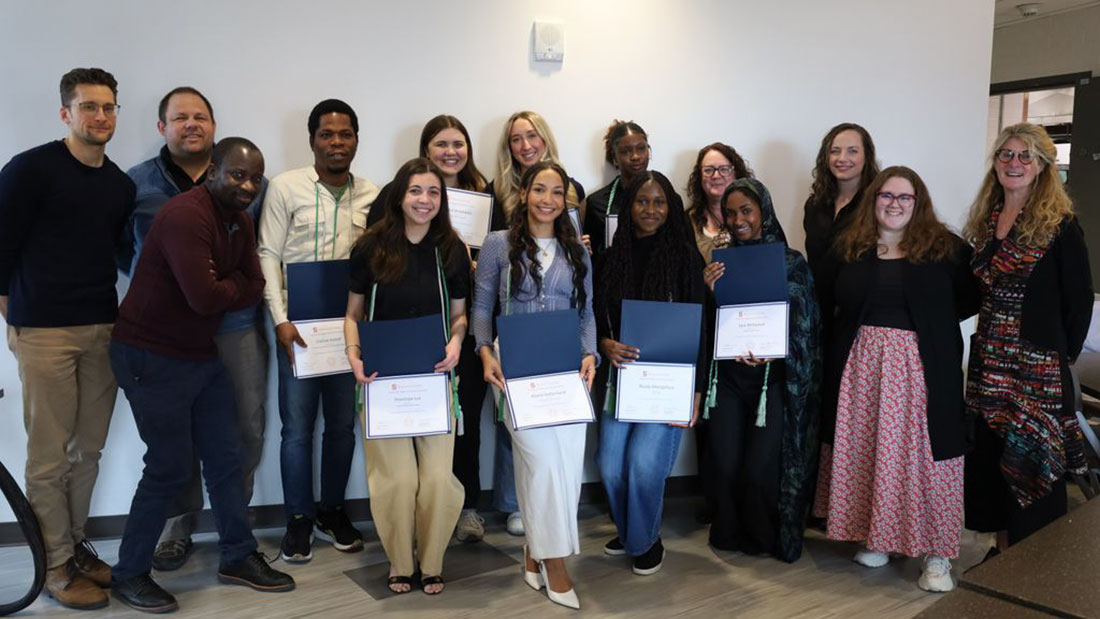
Class Marshal
The Undergraduate Class Marshal is a student who exemplifies the spirit of the senior class and has excelled during their time at Syracuse. Campus and community engagement and services are additional considerations for this award.
Recipient: Sashana Kinghorn-Bodley
Achievements:
- Major/Minor: BS Public Health, minor Psychology.
- Community Engagement: Emphasis on maternal/infant health; Sexual and Reproductive Health Advocate, Allyn Foundation.
- Leadership: Mentor, Syracuse University HEOP and Dimensions; Event Coordinator, Friends of MSF (Médecins Sans Frontières); member of the Rebecca Lee Pre-Health Society, Women in Science and Engineering, and Black Pre-Medical Society.
Capstone Internship:
Reach CNY, Syracuse, Maternal and Child Wellness: The Effectiveness of Home Visit Programs on Health Outcomes.
What’s next:
MPH at Cornell University.
Graduate Awards
Excellence in the Public Health Graduate Program
This award recognizes an outstanding student in the public health graduate program and is based on academics, quality of internship outcomes, and impact at the campus or larger community level.
Recipient: Collins Annor
Achievements:
- Near perfect cumulative GPA.
- Research projects and publications/presentations: (1) Challenges of delivering cardiology care via telehealth: A systematic literature review (Current Cardiology Reports, under review); (2) Cost-consequence evaluation of a radio campaign to improve full vaccination coverage among children under five in Ethiopia (BMC Public Health, under review); (3) Risk Factors for Injuries in College Football: A Systematic Review (Scientist Special Issue, under review); (4) Growing dependence on physician assistants: Balancing access & quality (in preparation); (5) Managing sickle cell disease with hydroxyurea, herbal medicines, and nutrition: A content analysis of African newspapers (in preparation).
Leadership:
Program Review & Assessment Committee (student member);
Student Engagement in Assessment, SU IEA mini-grant recipient (with Assistant Professor Bernard Appiah); Program Assessment Tools–One Sentence Summaries (OSS).
What’s next:
Ph.D., University of Memphis.
Class Marshal
The Graduate Class Marshall is selected for their achievement in scholarship, academic honors, student organization involvement, leadership, and collegiality, as well as campus and community engagement and service.
Recipient: Iaya Mohamed
Achievements:
- Leadership: Co-President of the Graduate Student Association for Public Health (GSAPH): building a culture of service, GSAPH; organized volunteer activities at the Rescue Mission, A Tiny Home for Good, and the Samaritan Center.
- Public Health Practice: AmeriCorps Graduate Public Health Fellow.
What’s next:
Pursuing employment.
Hands-On Learning
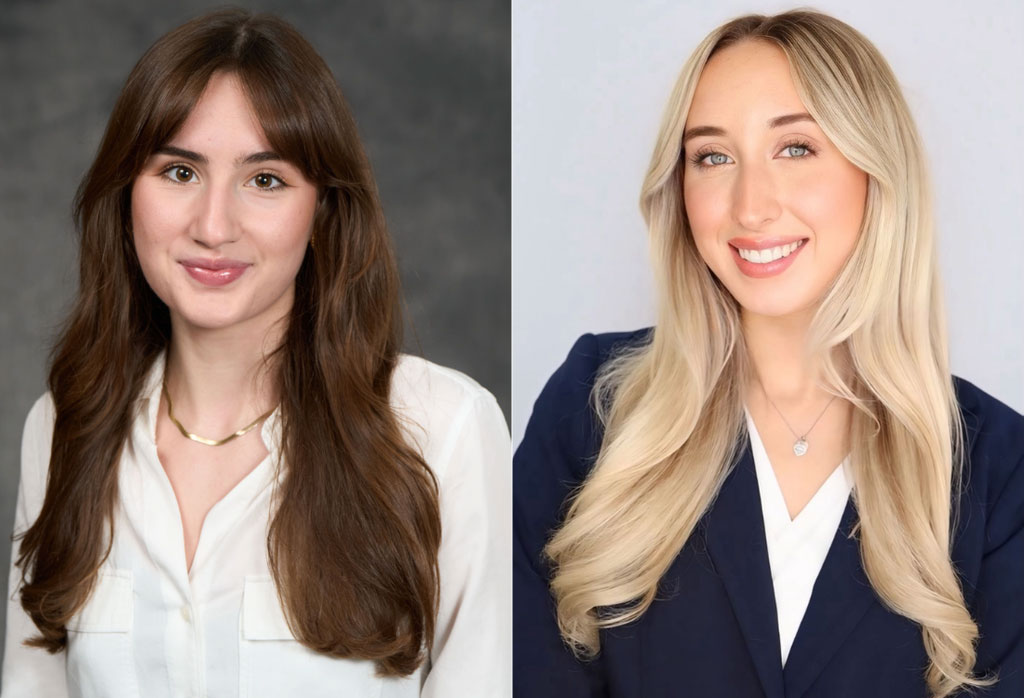
High-impact learning takes many forms, the chief of which are internships. From summer programs to longer-term academic credit opportunities, internships provide invaluable real-world experience. They also enhance employability and career prospects.
Studies show that internships—paid or unpaid, virtual or in-person—facilitate post-graduate success.
Here are a few such stories from members of the Class of 2025:
Soaring to New Heights
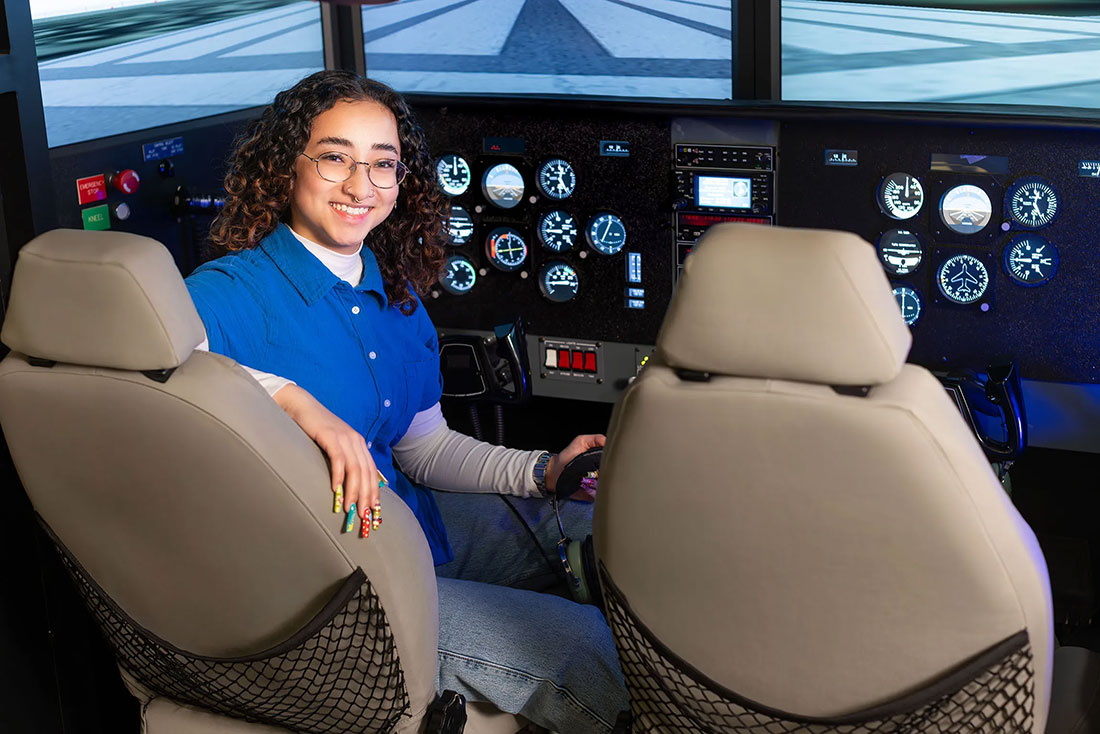
Allyson Almeida ’25 is well grounded for someone with her head in the clouds. While interning at National Grid, she helped the energy company obtain a Federal Aviation Administration (FAA) waiver.
These kinds of documents permit drone operations to occur beyond the visual line of sight (BVLOS)—crucial for the inspection and maintenance of hard-to-reach, overhead transmission lines.
“It was great being part of a team, doing something I’m passionate about,” recalls the New Jersey native, who is based in the College of Engineering and Computer Science (ECS).
At National Grid, Almeida became a certified remote pilot while making strategic connections at the FAA. She also mastered the BVLOS waiver process, which is notoriously complex.
“The waiver lays out every aspect of a drone mission according to industry standards,” says Almeida, an aerospace engineering major who has a job offer from the global satellite communications company Iridium. “I’m excited to apply my skills to real-world problems.”
Pursuing Her Passion
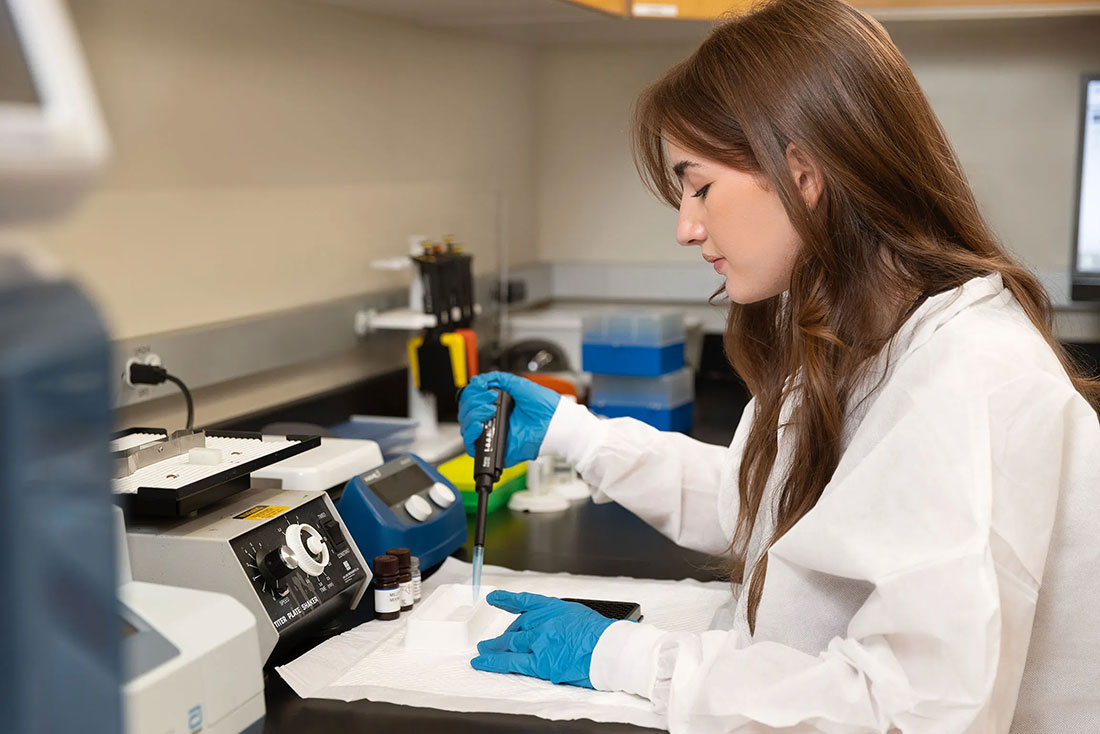
A health and exercise science major, Cuddihee enrolls this fall in the Doctor of Physical Therapy Program at Northwestern University. The program is part of Northwestern’s Feinberg School of Medicine in the heart of Chicago’s business district.
“I’m excited to apply my passion for research, patient-care advancements and human movement,” says the Wheaton native, who is a member of Feinberg’s centennial class.
Cuddihee attributes her med school acceptance to “impactful” internships through the David B. Falk College of Sport and Human Dynamics. She’s interned this past year at SUNY Upstate Medical University’s Institute for Human Performance, conducting gait analysis of people with cerebral palsy (CP).
But it was an internship at Chicago’s Shirley Ryan AbilityLab that sparked Cuddihee’s interest in CP and other neurological disorders. The experience was admittedly a departure from her previous stint at the Syracuse VA Medical Center, focusing on physical therapy.
“Syracuse has brought me joy that I had never anticipated,” Cuddihee continues. “Now I’m sharing that excitement with people who need it most.”
Strengthening Her Skills
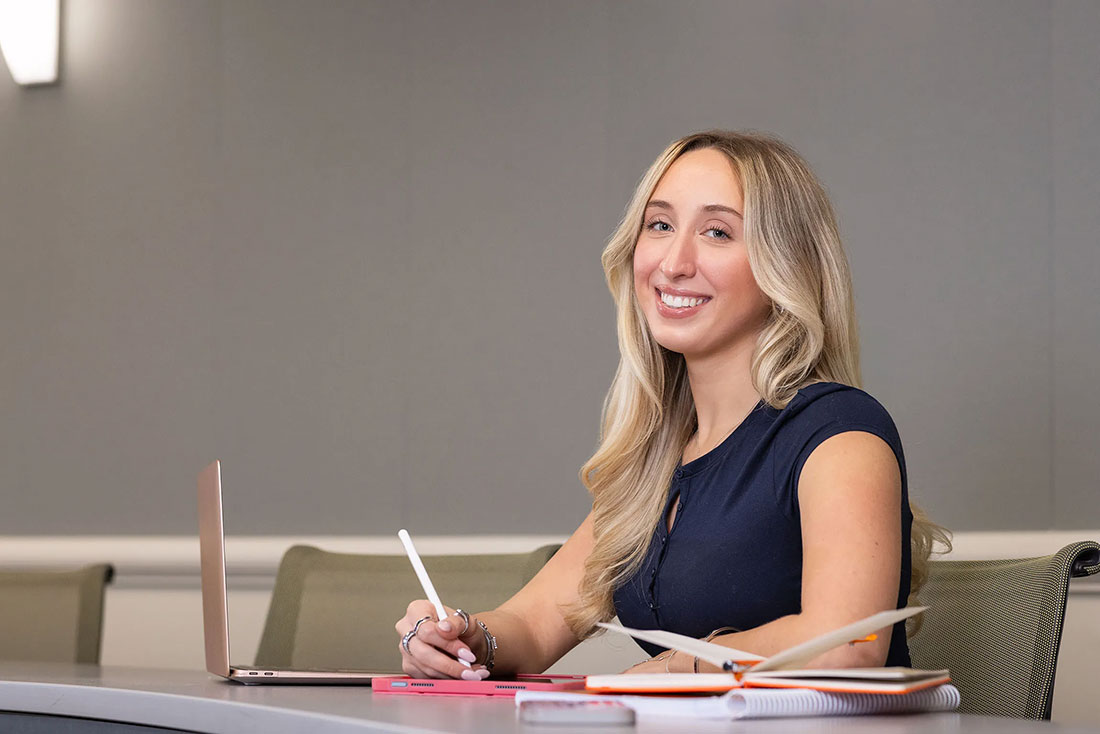
Shelby Fenton ’25, G’26 is a testament to the power of accelerated learning. In May, she graduates from Falk College with a bachelor’s degree in public health—part of a five-year, combined degree program culminating in an MPH. Fenton is on track to finish a year early.
“I’m getting a jump on med school,” says the native of Amsterdam, New York. “I’m interested in both the science and practice of public health.”
Amsterdam figures prominently in Fenton’s academic career, which has included internships at St. Mary’s Hospital and Healthcare Network. Currently a patient care technician at St. Mary’s, she’s used one of her internships there to implement Baby-Friendly Hospital Initiatives.
“I have a passion for medicine,” says Fenton, who also has volunteered at Global Medical Brigades and SUNY Upstate Medical University Hospital. “My internships have strengthened my leadership, problem-solving and patient advocacy skills.”
Fenton lauds Syracuse University for its social justice approach to public health. She’s fiercely committed to wiping out health inequities while finding ways for physicians and public health practitioners to collaborate more effectively.
“Public health involves diverse voices, experiences and perspectives,” Fenton observes. “I’m honored to see some of my ideas already take shape within hospital policy.”
Engineering a Legacy

Attending Syracuse University is a family affair for Andrew Vanderwege, a senior majoring in environmental engineering (EE). He and his brother, John ’27 (also an EE major), along with their parents, Maureen ’97 and Mike ’96, are card-carrying members of ECS.
Vanderwege became interested in “fixing the climate crisis” at a young age. This led to his enrollment at ECS, where he’s been exposed to the “world of academic research” and to new battery and fuel cell technologies.
In addition to working in various labs, like the Syracuse Center of Excellence in Environmental and Energy Systems, Vanderwege has interned at Ramboll, a global architecture, engineering and consulting firm with offices in Syracuse.
“Ramboll introduced me to the industry side of environmental engineering. It also reinforced my interest in [developing] engineering solutions to solve the climate crisis,” says Vanderwege, who minors in electrical engineering and energy systems in ECS and mathematics in the College of Arts and Sciences.
The Western New York native is excited to continue honing his technical design skills. The 2024 recipient of the Samuel Brundage Scholarship Award from the Alumni Club of Rochester, he plans to pursue a Ph.D. in mechanical engineering. “There’s so much I still want to learn.”
For more information about internships, visit Syracuse University Career Services.
A Syracuse University story by Rob Enslin originally published on April 22, 2025.
Esteemed Scholarships
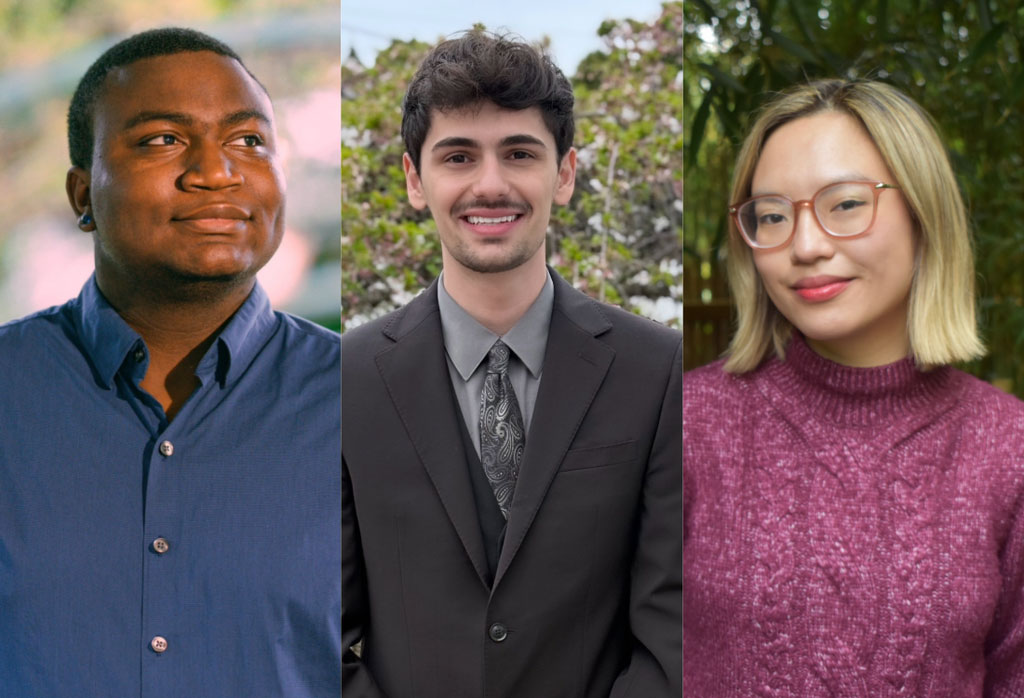
Thirty-five students have been chosen as the 2025-26 Syracuse University Remembrance Scholars.
The scholarships, now in their 36th year, were founded as a tribute to—and means of remembering—the students studying in London and Florence through Syracuse University who were killed in the Dec. 21, 1988, bombing of Pan Am Flight 103 over Lockerbie, Scotland. Those students were among the 270 people who perished in the bombing. The scholarships are funded through an endowment supported by gifts from alumni, friends, parents and corporations.
Significant support for the Remembrance Scholarships has been provided by Jean Thompson ’66 and Syracuse University Life Trustee Richard L. Thompson G’67 in memory of Jean Taylor Phelan Terry ’43 and John F. Phelan, Jean Thompson’s parents; by Board of Trustees Chairman Emeritus Steven Barnes ’82 and Deborah Barnes; by The Syracuse Association of Zeta Psi in memory of Alexander Lowenstein; and by the Fred L. Emerson Foundation.
Selection Process
Remembrance Scholars are chosen in their junior year through a competitive selection process. Applicants submitted an essay and a reflective response in multimedia, artistic, musical or written format as part of a comprehensive application. The application evaluation committee is composed of University faculty and staff and current Remembrance Scholars. The $5,000 scholarships are awarded on the basis of community impact, leadership, creativity and thoughtful academic inquiry.
“Remembrance Scholars, through their academic achievements, leadership and contributions to the campus and local communities, exemplify what a Syracuse University education has to offer and represent the promise of the students for whom these scholarships are named,” says Lois Agnew, vice chancellor, provost and chief academic officer. “We are proud to recognize their accomplishments.”
The Remembrance Scholars plan the Remembrance activities held at the University each year, and the cohort will be recognized during a convocation in the fall.
The 2025-26 Remembrance Scholars, their hometowns, majors and schools and colleges are the following:
- Ellie Allen of Newton, Massachusetts, a citizenship and civic engagement major in the Maxwell School of Citizenship and Public Affairs, a policy studies major in the Maxwell School and College of Arts and Sciences (A&S), and a member of the Renée Crown University Honors Program;
- Jacqueline Arbogast of Warwick, New York, a television, radio and film major in the S.I. Newhouse School of Public Communications;
- Rohan Bangalore of Sterling, Virginia, a policy studies major in the Maxwell School and A&S and a law, society and policy major in the Maxwell School;
- Caiyan Bass of Aurora, Colorado, a communication sciences and disorders major in A&S;
- Michael Capous of Wantagh, New York, a nutrition science major (pre-med track) in the David B. Falk College of Sport and Human Dynamics;
- Belinda Chan of Brooklyn, New York, a social work major in the Falk College;
- Tommy DaSilva of Newark, Delaware, a public health major in the Falk College; a policy studies major in the Maxwell School and A&S, and a citizenship and civic engagement major in the Maxwell School;
- Nick Dekaney of Syracuse, New York, a broadcast and digital journalism major in the Newhouse School;
- Ava Downey of Newport Beach, California, a linguistics major in A&S, an international relations major in the Maxwell School and A&S, and a member of the Renée Crown University Honors Program;
- Leah Farrell of New Milford, Connecticut, a citizenship and civic engagement major in the Maxwell School and policy studies major in the Maxwell School and A&S and a member of the Renée Crown University Honors Program;
- Abbey Fitzpatrick of Pacific Grove, California, a history and political science major in the Maxwell School and A&S;
- Olivia Fried of Clinton Corners, New York, an international relations major in the Maxwell School and A&S and magazine, news and digital journalism major in the Newhouse School;
- Tanishka Gajula of Chicago, Illinois, a biology major (pre-med track) in A&S;
- Olutoyin Green, of Long Island, New York, a health humanities and political philosophy major in A&S, a law, society and policy major in the Maxwell School, and a member of the Renée Crown University Honors Program;
- Alani Henderson of Syracuse, New York, a political science major in the Maxwell School and A&S and a law, society and policy major the Maxwell School;
- Nico Horning of El Dorado Hills, California, a broadcast and digital journalism major in the Newhouse School;
- Wafiq Khondkar of New Hyde Park, New York, a biotechnology and philosophy major in A&S and member of the Renée Crown University Honors Program;
- Edward Lu of Robbinsville, New Jersey, a music composition major in the College of Visual and Performing Arts (VPA);
- Joy Mao, of Cary, North Carolina, a policy studies major in the Maxwell School and A&S, a television, radio and film major in the Newhouse School, and a member of the Renée Crown University Honors Program;
- Martinez-Gutierrez of Laredo, Texas, a geography and sociology major in the Maxwell School and A&S; an environment, sustainability and policy major in the Maxwell School, and a member of the Renée Crown University Honors Program;
- German Nolivos of Miami, Florida, a political science major in the Maxwell School and A&S and a public relations major in the Newhouse School;
- Luiza Owour of Kisumu, Kenya, a biomedical engineering major in the College of Engineering and Computer Science (ECS);
- Marc Pantano of Newington, Connecticut, a marketing and supply chain management major in the Martin J. Whitman School of Management;
- Annaliese Pillitteri of Babylon, New York, a film major in VPA;
- Savion Pollard of Queens, New York, an electrical engineering major in ECS and a U.S. Navy veteran;
- Zachary Setzkorn of Overland Park, Kansas, a geography and history major in the Maxwell School and A&S, a social studies education major in the Maxwell School and School of Education, and member of the Renée Crown University Honors Program;
- Ethan Shavelson of Parkland, Florida, an acting major in VPA;
- Taylor Stubitsch of Arlington Heights, Illinois, a biochemistry and forensic science major in A&S and member of the Renée Crown University Honors Program;
- Candace Tabb of Rocky Hill, Connecticut, a civil engineering major in ECS;
- Nathan Torabi, of Visalia, California, a political science major in the Maxwell School and A&S; a citizenship and civic engagement and law, society and policy major in the Maxwell School, and a member of the Renée Crown University Honors Program;
- Jacquelyn Trotman of Edison, New Jersey, a retail management major in the Whitman School, an advertising major (creative track) in the Newhouse School, and a member of the Renée Crown University Honors Program;
- Anya Von Wolff of San Francisco, California, a fashion design major in VPA;
- Logan Wagner of Great Falls, Virginia, a political science major in the Maxwell School and A&S, an environmental sustainability and policy major in the Maxwell School and a history of music and cultures major in A&S;
- Gillian Weltman of Rochester, New York, a communications sciences and disorders and neuroscience major in A&S; and
- Ethan Yankey of Roseau, Dominica, a design studies major in VPA.
A Syracuse University News story by Kelly Homan Rodoski originally published on April 17, 2025. Here’s a video and story featuring Falk College’s 2024-25 Remembrance Scholars, Alyssa Sutherland and Tabitha Hulme.
What’s the Buzz?
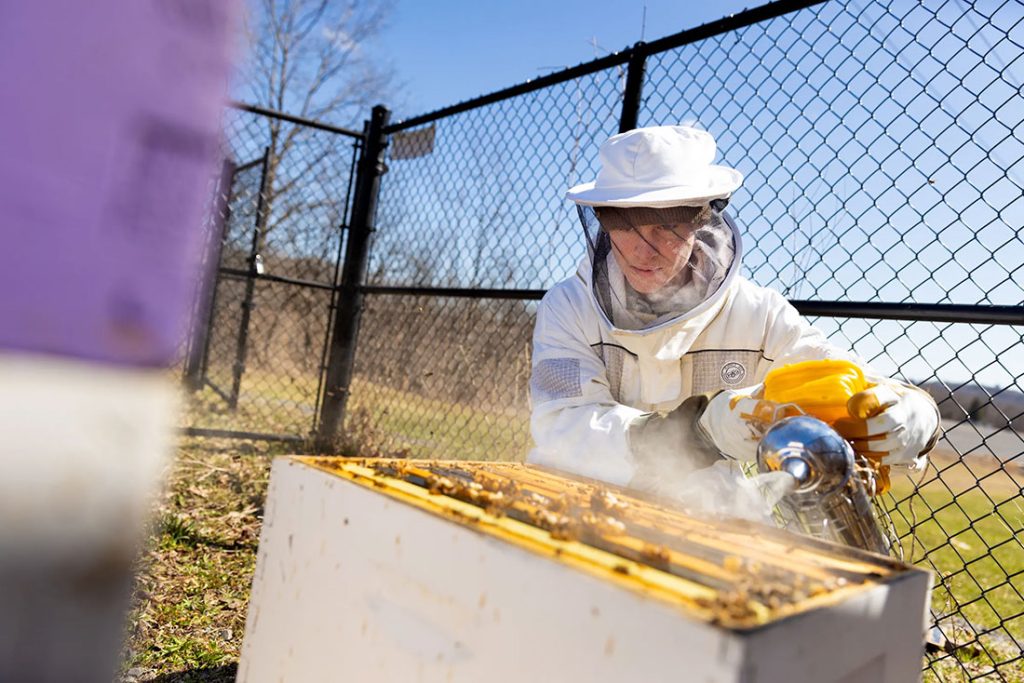
When warm weather finally arrives in Central New York, Christopher Hansen ’25 will be ready to suit up for close encounters with honeybees. Hansen is president of the Beekeeping Club at Syracuse University, a recognized student organization that he founded in 2023 to help manage the University’s honeybee hives on South Campus. “I decided to create the club and try to get more people to join and help teach them about beekeeping,” says Hansen, a chemical engineering major in the College of Engineering and Computer Science. “This spring I’m hoping to get a lot more people to go out and suit up with me.”
Hansen took up beekeeping more than a decade ago, joining his father and grandfather managing about 20 hives downstate in Orange County. “It’s definitely a unique hobby, and honey production is really cool,” he says, likening it to vegetable gardening. “You’re building up a living colony to produce something to harvest. You have a field of workers in your backyard, and you have to work with them because you don’t want to take too much of their food and want to make sure they’re happy and doing well. It’s like having your own factory in the backyard.”
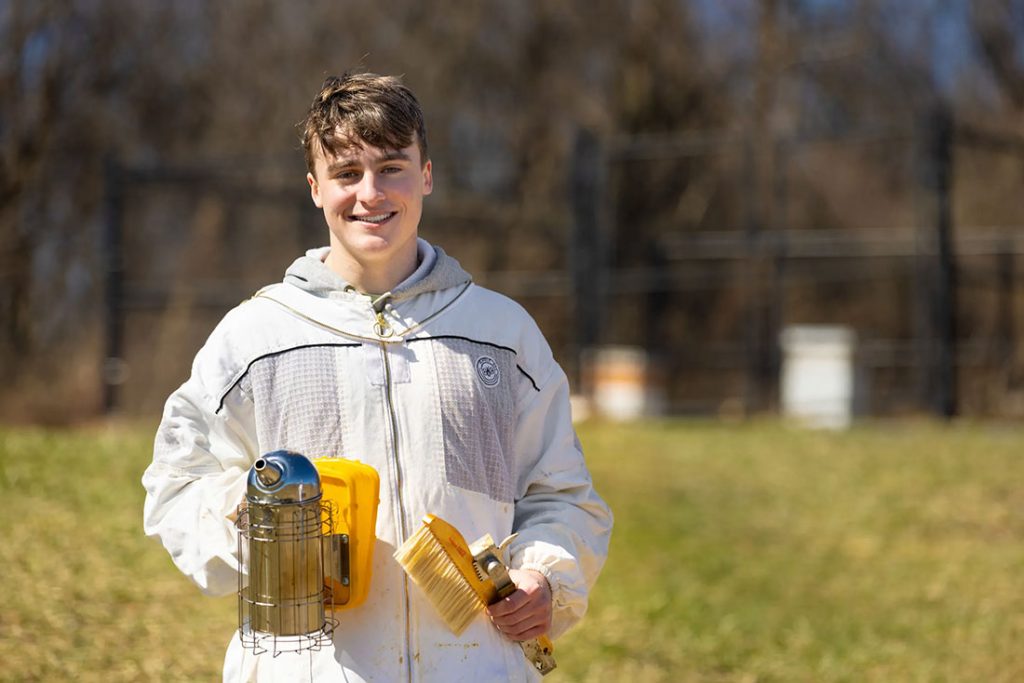
Promoting Pollinators and Pollination
Public health professor Lisa Olson-Gugerty and nutrition and food studies professor Mary Kiernan of the David B. Falk College of Sport and Human Dynamics introduced honeybees to the South Campus landscape in spring 2020. Supported by a College as a Lab for Sustainability grant, they set up six hives that became home to over 300,000 honeybees. Since then, the bees’ honey has been harvested in the summer and early fall, to be bottled and sold on campus. The hives are also part of the University’s initiative as an affiliate of the Bee Campus USA program, a nationwide organization of college and university campuses dedicated to conserving pollinators.
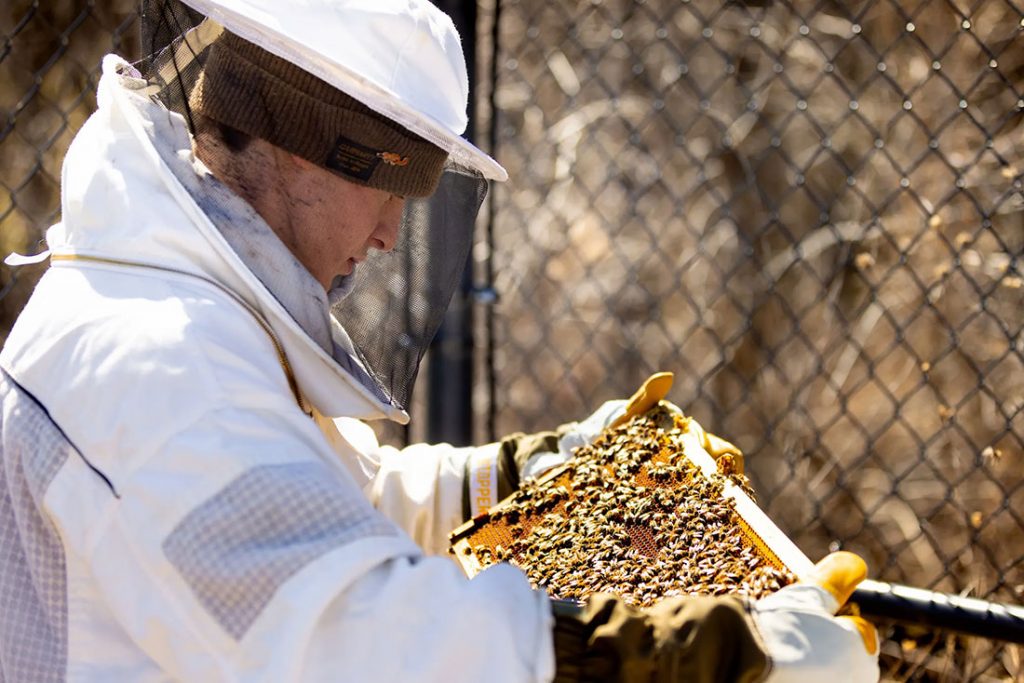
“From an academic standpoint, maintaining hives can provide students with hands-on learning experiences related to ecology, biology, environmental science and sustainability,” says Olson-Gugerty, who serves as faculty advisor to the Beekeeping Club. “It allows students to observe pollination, understand the roles of bees in biodiversity and explore sustainable agricultural practices.”
In recent years, the University has enhanced its sustainability management practices, creating native pollinator habitats with native plant species, minimizing the use of pesticides and establishing a Pollinator Garden as part of Pete’s Giving Garden on South Campus. “Bees play a crucial role in local ecosystems by pollinating plants, which enhances biodiversity and contributes to a healthier campus environment,” Olson-Gugerty says. “They also serve as bioindicators, helping monitor environmental health and the effects of climate change.”
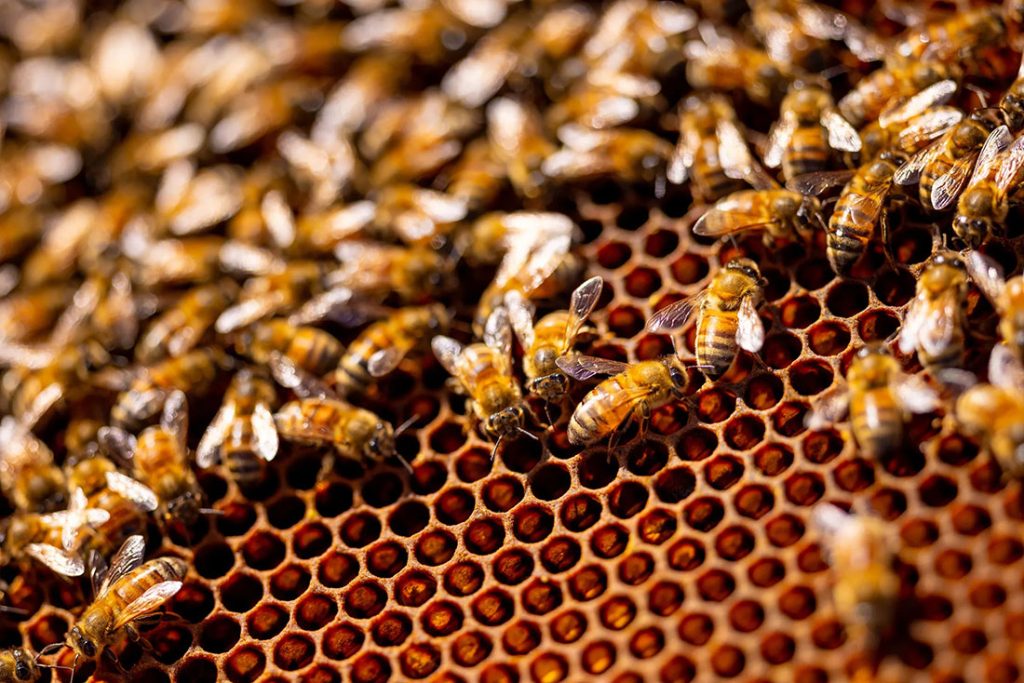
A Relaxing Routine
When Hansen learned about the South Campus colony, he reached out to Olson-Gugerty, letting her know he had experience beekeeping and was interested in helping. In April, in collaboration with other student organizations, the club plans to host a wildflower seed-paper-making event. It’s also holding information sessions and readying a schedule for hive visits.
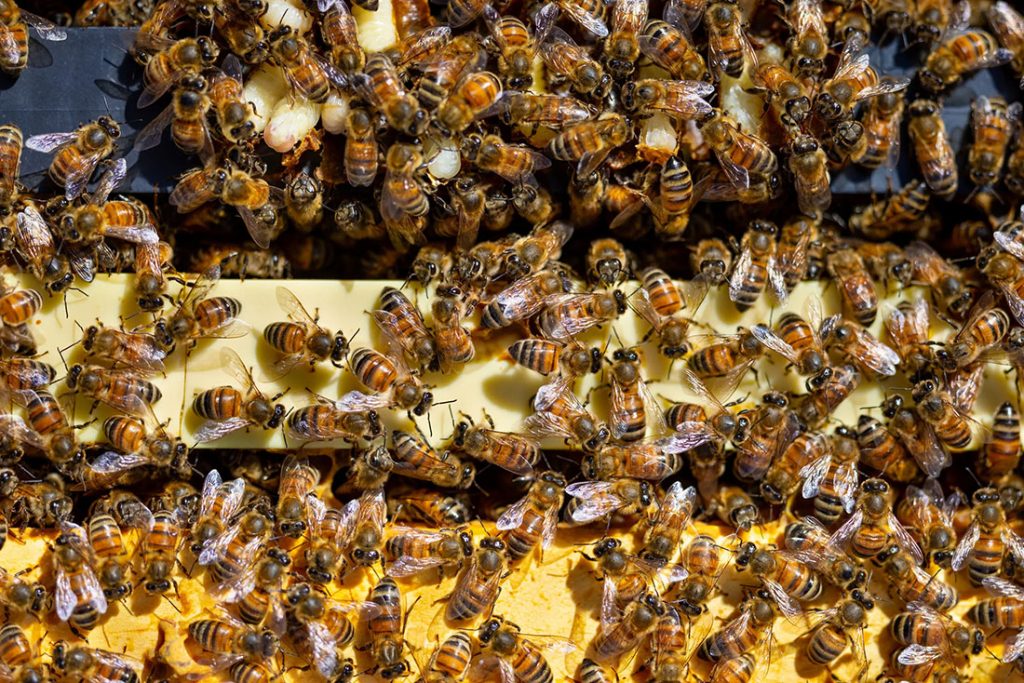
For Hansen, the entire process is fascinating—from managing the population of the hives to ensuring the queen bee is laying eggs to seeing worker bees that have been gathering pollen (their protein source) and nectar. “They have these little bags in their legs that they store the pollen on, so when they’re going flower to flower, some will fall out and pollinate the plants they visit,” he says. “You can see them fly back into the hives, and they have bright yellow and orange legs because they’re filled up from all the pollen they’ve been collecting.”
While occasional bee stings happen, Hansen enjoys the methodical routine associated with beekeeping. “Once you get over the fact that you got thousands of bees flying around you, it’s really relaxing,” he says. “You don’t have to think too much and there’s minimal strategy. You kind of tuck your mind away and just go to work.”
A Syracuse University story by Jay Cox originally published on March 4, 2025.
Giving Day at Falk!
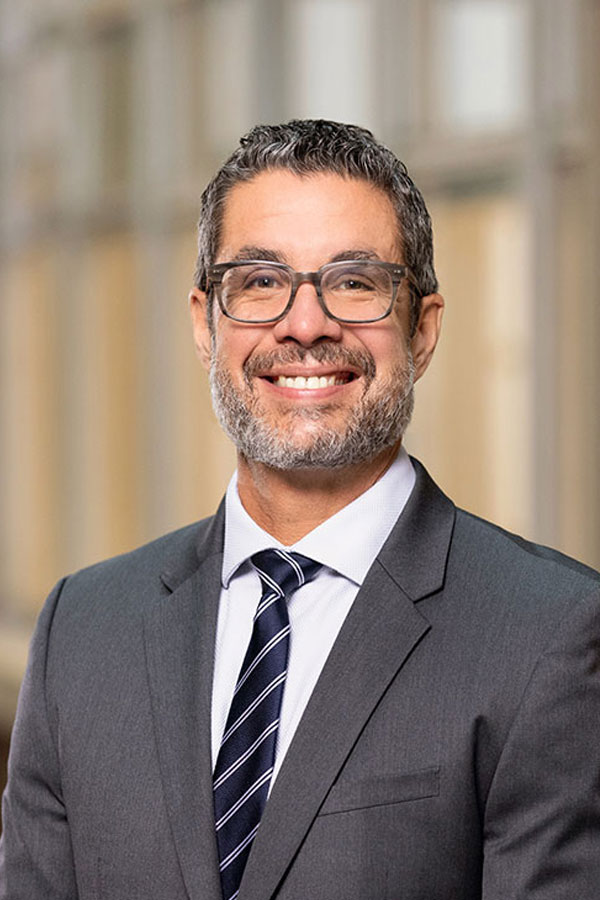
Dear Falk College Family,
Happy Syracuse University Giving Day! March 27 is the day when Syracuse’s global community unites for 24 hours of impact, friendly competition, and plenty of Orange pride!
Here in Falk College, we’re promoting giving that provides Falk students with transformative learning experiences from the classroom to the community and around the globe.
You have several giving options. Visit our campaign page to give directly to the Falk College Dean’s Fund, or visit our giving page if you’d like to give to a different fund that will support students in a specific program. For our friends in the human dynamics’ programs, please know that gifts to your programs will follow you to your new homes in Arts and Sciences, the Maxwell School, and the School of Education.
Please consider making a gift today to help our students reach their full potential!
Sincerely,
Jeremy S. Jordan, PhD
Dean and Professor
Falk College
Page 1 of 26
